ESL Activities
ESL Games, Activities, Lesson Plans, Jobs & More
in Icebreakers + Warm-Ups · Listening · Reading · Speaking · Writing

Travel & Holidays ESL Games, Worksheets | ESL Travel Activities
If you need some fresh, new ideas for the ESL travel and holiday unit that you can find in most textbooks, then you’re in the right place. We’ll share our top ideas for games and activities, along with travel vocabulary, worksheets and lesson plans. Let’s get to the best ESL holiday activities.

ESL holiday and travel-themed activities
Let’s get into everything you need to know for an ESL holiday lesson. Keep on reading!
ESL Travel and Holiday Activities
Here are the top ESL travel activities that you may want to try out with your students.
#1: Plan a Trip
Have your students plan a dream vacation in English! Instead of researching in their first language, use Google in English. In order to practice writing, keep notes only in English. Here’s an example of how you might plan your trip using English. You can have your students add as little, or as much detail as you’d like. However, the point of the activity is to practice writing in point form which is useful when writing outlines for tests or essays.
Day 1: Monday, January 1
Fly Seoul (3pm) —-> Vancouver (7am) Check in Hotel ABC, 123 Avenue Rest, relax
Day 2: Tuesday, January 2
Stay Hotel ABC Tour Stanley Park Eat Pub XYZ dinner
Day 3: Wednesday, January 3
Check out Hotel ABC Rent car Budget 123 Drive Whistler Rent skis shop ABC Go Skiing Lunch ski lodge Check in Hotel ABC Whistler Bed early
Procedure for one of my favourite ESL travel activities:
- Give students time to do some Internet research about a place they want to go. It’s helpful to specify the number of days. I generally make a rule that they must do this research in English. Suggest some helpful websites where they might like to start (Trip Advisor, Air BnB, etc.).
- Students can make a day-by-day itinerary of what they’re trip is going to look like.
- They can share about their trip with the class or turn it in for a graded assignment.
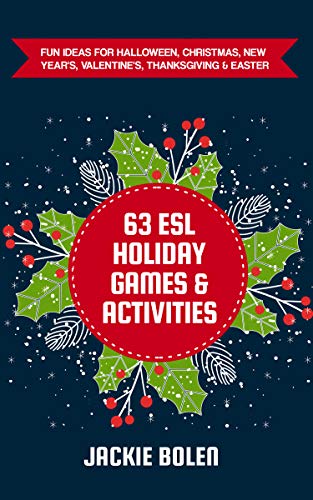
- Amazon Kindle Edition
- Bolen, Jackie (Author)
- English (Publication Language)
- 78 Pages - 03/22/2021 (Publication Date)
#2: A-Z Alphabet Game
If you know that your students already know a fair bit about holiday and travel, you may want to try this quick warm-up game. Or, you could consider using it as a review game at the end of a class.
The way it works is that students, in pairs or small groups write down the alphabet on a piece of paper. Then, they have to think of one travel related word for each letter. It doesn’t have to be done in order. For example:
P: Passport
The winner is the team with the most completed letters at the end of the allotted time. Do you want to find out more? Check this out: A-Z Alphabet Game ESL .
#3: Travel Word Association
This is nice ESL activity to do if you know that your students have studied about travel and holidays before. They can shout out vocabulary words related to this and you can make a mind map or sorts on the board. Group similar things together. For example, articles of clothing.
Find out more about this quick ESL warmer right here: ESL Vocabulary Word Association.

- 146 Pages - 06/18/2020 (Publication Date)
#4: Postcards ESOL Travel Activity
If you can get your hands on some cheap postcards or have some laying around your house or teacher’s office, try out this fun writing activity. It may just be the novelty factor, but students seem to love it. This activity is ideal for working on common greetings, the past tense (more ideas here: ESL past tense games ), and using descriptive words, as well as using synonyms to avoid repetition.
Distribute the postcards to the students. You can do one per student, or put the students into pairs. They have to look at the picture on the front of the postcard and imagine that they went on this vacation. Then, they can write about their trip to a friend or family member.
Next, the students trade postcards with another student or group. After reading them, they can write a response back of at least a few sentences. Finally, you may want to display them around the class as they’re colourful and fun and other students may enjoy reading them! Have some fun with this ESOL travel activity.
- Give each student or pair a postcard. They look at the picture and imagine what they did on that vacation, and then pretend that they’re writing to a friend or family member.
- Exchange postcards and another student or group have to write a response to what they read.
- Display the postcards around your classroom (optional).
#5: Travel or Holiday Videos
I’m ALL about using videos with my ESL/EFL students. They’re fun, engaging and a nice way to grab student’s attention and introduce a topic. Of course, you can base an entire class around one too if you design the activities well.
If you want to find out more about using them in your classes and some activities and games to do with them, you’ll want to check this out: Using Videos for Teaching English .
#6: Dictogloss ESOL Travel Activity
This is a challenging activity that works on listening and writing skills. Find a short story related to holiday or travel. It could even be a description of your own vacation that you took recently.
Then, you read out the story to your students in a way that is a bit challenging for them to catch every word. Students have to take notes and then try to reconstruct what they heard based on their notes in small groups. You can read it again so that students have a chance to make some additions or corrections. Finally, students compare their version with the original.
Do you want to try it out with your students? You can learn more about one of the best ESL travel activities here: ESL Dictogloss Activity .
#7: Holidays ESL Lesson Plan
It’s easy to plan an ESL lesson about any topic, including holidays. Check out this video for the steps to follow:
#8: Yes/No Questions and Answers
If you think about it, holidays and travel lend themselves to a ton of yes/no questions. For example:
- Did you fly or drive?
- Did you eat some delicious things?
- Was the food good?
- Did you have nice weather?
If you want to see some activities or games to work on these kinds of questions, you’ll want to check this out: Yes/No Activities and Games.

- 279 Pages - 07/12/2020 (Publication Date)
#9: ESL Food Activities and Games
I’m not sure if it’s the same for you, but when I travel, it’s ALL about the food. I want to try all the delicious things where I’m staying! The good news is that I have a ton of fun, interactive games and activities for food. You can easily adapt most of them to focus on holidays.
You can find out more details here: ESL Food Activities.
#10: ESL Surveys
I love to use surveys in my classes because they lend themselves to just about any topic. In the case of travel, they’re ideal for working on the present perfect and simple past together.
For example:
Have you ever travelled to another country?
Where did you go?
If you want to know more about how to design and use surveys in your classes for an ESL travel lesson, then you’ll want to check this out: Surveys for ESL Students.

ESL Travel Games and Activities
I also love to use ESL surveys to get students to express an opinion in English.
#11: Present Perfect Activities Related to Travel
The present perfect is often used to talk about vacations, travel and holidays. For example:
- Have you ever been to another country?
- Have you travelled to ______ before?
In order to incorporate this grammatical construction into some of your lesson, you’ll want to check this out: Present Perfect ESL Activities.
#12: Brochure Scanning
This is an excellent travel activity! You’ll have to get your hands on some travel brochures first. The way it works is that students get tons of practice with a reading sub-skill (scanning) because they have to look quickly through the brochures to find specific bits of information. For example, cost or number or days.
Do you want to try out this reading activity? You can find out all the details here: Brochure Scanning Reading Activity for ESL .
#13: Odd One Out ESL Warmer
This is a quick English warm-up activity that you can try out with your students. The way it works is that you write words, in groups of 4 on the board. 3 are similar and 1 is the odd one out. Students have to choose this one and say why it doesn’t fit. For example:
Bathing suit, sunglasses, boots, flip-flops
Answers: Boots because it’s not for a beach vacation. I accept many different answers as long as students support it well.
You can learn more about this ESL warm-up here: Odd One Out for ESL .

- 87 Pages - 10/24/2019 (Publication Date)
#14: Would you Rather?
I’m sure you’ve done this before with friends. You have to choose between two negative things, or two positive things. For example, how you want to die, or what you want to eat. In this case, students could choose between two types of vacation. For example:
Would you rather have a beach or forest vacation?
Would you rather stay in a big hotel, or an AirBNB?
Learn more about this nice activity for an ESL travel lesson here: ESL Would You Rather?

- 99 Pages - 06/22/2021 (Publication Date)
#15: Task Based Activity: Dream Vacation
I love to incorporate this style of teaching into my holiday lessons. It allows students more freedom to choose what they want to learn about and also builds opportunities for some serious teamwork.
In this case, I’ll have students work in groups of 2-3 to plan a dream vacation. They can do some research to find out all the details including how to get there, food, budget, where to stay, etc. Then, they either have to write a report and hand it in to me and/or do a short presentation to the class.
Need some more ideas for this style of a lesson? Check this out: Task-Based Learning .
#16: Travel Themed Charades
I love to play charades with my students. The way it works is that you can think of some travel-related phrases. For example:
- Flying on a plane
- Sleeping on a bus
- Eating noodles
- Buying souvenirs
Then, students have to act this out and their teammates have to guess what the phrase is. More details here: ESL Charades.
#17: Travel Journal
Encourage students to keep a travel journal for a fictional trip. They can describe their experiences, sights, and sounds, using new vocabulary.
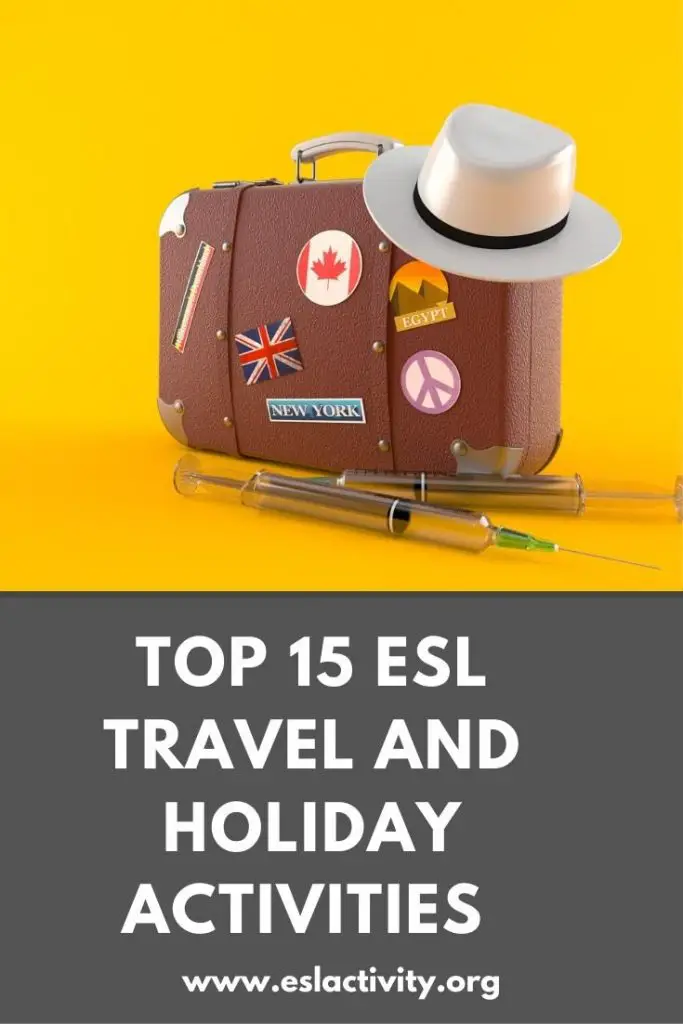
Travel and Holidays ESL
#18: Eliciting in an ESL Travel Lesson
Unless your students are absolute beginners, then it’s likely that they already know a good amount of travel and holiday vocabulary. That’s often why I like to start off my ESL traveling lesson by using some eliciting techniques. There are two main reasons for this.
The first reason is that it’s possible to find out what the students already know about this topic to avoid wasting class time covering these things. The second is that it helps students activate their prior knowledge about travel/holidays to make the new things they learn more memorable. Learn how to do this tactic for an ESL holiday lesson here:
ESL Eliciting Advice .
#19: Travel Listening Lesson
A nice way to talk about any topic is through a listening lesson. In this case, find a conversation between two people talking about an upcoming vacation plan. Or, someone talking about a favourite vacation from the past (it could even be you). Then, design an entire listening lesson around that. Find out how here:
#20: Idiom ESL Traveling Activity
There are lots of idioms related to holidays, travel and transportation. Here are just a few of them:
- All hands on deck
- To send flying
- Bump in the road
- Off the rails
- Train wreck
- Asleep at the wheel
- Fall off the wagon
- Hit the road
One of the best ways to make these idioms super memorable is to do this fun activity. Afterwards, your students will never forget! Learn more about this ESL activity:
Idiom Activity for Language Learners .
#21: Concentration ESL Traveling Vocabulary
One of the best ways to review new words during an ESL holiday or travel lesson is to play this memory game. Depending on the level of the students, make some matching pairs of cards with the following:
- Word/picture
- Word/definition
- Word/clue about the word
Then in small groups, students play the game to find the matches. Find out all the details about how to set it up and play:
ESL Concentration Game .
#22: Speaking Fluency Activity
To use this activity with a unit on holidays or travel, have students talk about a past, or upcoming vacation.
#23: Me Too!
Students have to make a true statement about themselves related to holidays and travelling. For example:
- I’ve been to Japan.
- I hate the beach.
- My family goes on a big vacation every summer.
If other students can agree, they stand up and say, “Me too!”
#24: Labour Day Guessing Game
#25: Holiday Interviews
Pair students and have them interview each other about their favorite holidays. They can then present their partner’s holiday to the class.
#26: Travel Bingo
Create bingo cards with images or words related to travel and holidays. Students mark off the squares as they learn new vocabulary.
#27: Travel-Themed Role-Plays
Set up role-plays where students act as travelers, airport staff, or hotel receptionists. This helps them practice common travel dialogues.
#28: Travel Vocabulary Pictionary
Play Pictionary using travel-related words. Students take turns drawing and guessing the vocabulary words.
#29: Travel Storytelling
Ask students to create and share short stories about a memorable travel experience they’ve had or wish to have in the future.
#30: Travel Debate
Have students debate the pros and cons of traveling. This encourages critical thinking and speaking skills.
Travel and Holiday Vocabulary
Here are some of the most common vocabulary words that you may want to teach your students related to traveling for an ESL holiday lesson.
- bathing suit
- boarding pass
- vaccination
- The months of the year in English
Do you have any ESL travelling vocabulary that you’d like us to add to the list? Leave a comment and let us know!
Travel Worksheets and Lesson Plans for ESL
If you’re looking for some worksheets or lesson plans related to holidays and travel, then you’ll want to check out some of our top resource recommendations:
ESOL Courses
ISL Collective
Lingua House
ESL Travel Vocabulary Worksheets
If you want students to get some practice with ESL travel vocab, here are a few recommendations:
English Club
Did you Like these Travel Games for ESL?
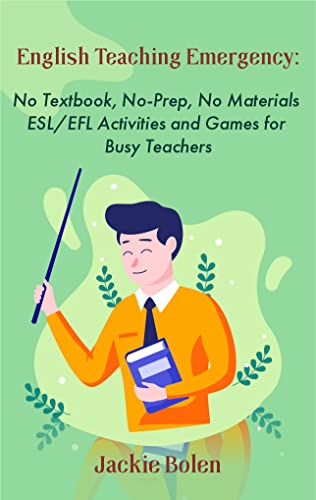
- 68 Pages - 11/12/2019 (Publication Date)
Yes? Thought so. Then you’re going to love this book: The Emergency English Teacher: No-Textbook, No-Prep, No-Materials ESL Activities.
If you’re always in need of last-minute activities and games for your classes, then this book is exactly what you might need. It’s English teaching made easy in a serious way.
You can get the book in digital or print formats. Take the e-version with you to your favourite coffee shop for lesson planning on the go. Or, keep a copy on the bookshelf in your office to use as a handy reference guide. But the best idea is to have it with you at all times for those English teaching emergencies.
Do you want to find out more? Head on over to Amazon to pick up your copy today:

FAQs about ESL Travel Lessons
There are a number of common questions that people have about teaching this unit. Here are the answers to some of the most popular ones.
What is the purpose of teaching the travel and holiday unit to English learners?
The purpose is to help English learners develop vocabulary, grammar, and conversational skills related to travel and holidays.
What topics can be covered within the travel and holiday unit?
Topics can include modes of transportation, booking accommodations, tourist attractions, holiday activities, travel phrases, and cultural aspects of different destinations.
How can I introduce vocabulary related to travel and holidays?
You can introduce vocabulary through visual aids, realia (actual objects), flashcards, and interactive activities such as matching games or vocabulary quizzes.
What grammar structures can be taught in the travel and holiday unit?
Grammar structures such as present simple for schedules and timetables, past simple for recounting travel experiences, future tenses for making travel plans, and modal verbs for expressing preferences or asking for permission can be taught.
What speaking activities can be used to practice travel and holiday-related topics?
Role-plays, group discussions about dream destinations, travel itineraries, or describing holiday experiences are effective speaking activities. Additionally, pair work activities like “Find Someone Who” or “Guess the Destination” can engage learners in conversation.
ESL Travel Activities and Games: Join the Conversation
What are your thoughts about these Holiday ESL activities? Do you have another one that you’d like to recommend to us? Leave a comment below and let us know what you think. We’d love to hear from you.
Also be sure to give this article a share on Facebook, Pinterest, or Twitter. It’ll help other busy English teachers, like yourself find this useful resource for ESOL travel lessons.
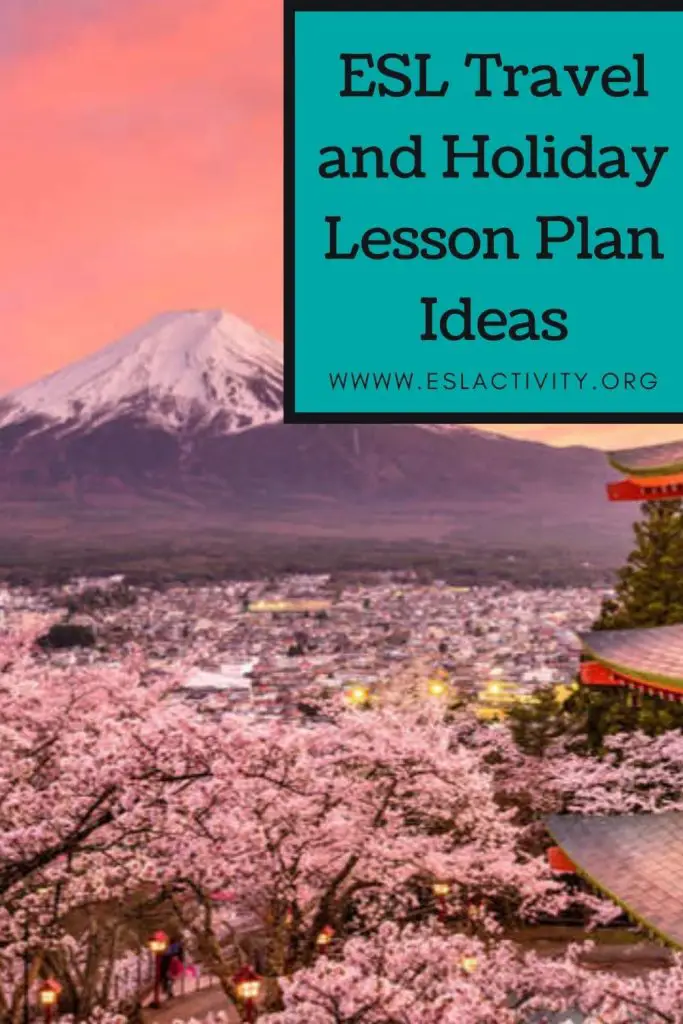
ESL Travel Lesson
Last update on 2022-07-17 / Affiliate links / Images from Amazon Product Advertising API
About Jackie
Jackie Bolen has been teaching English for more than 20 years to students in South Korea and Canada. She's taught all ages, levels and kinds of TEFL classes. She holds an MA degree, along with the Celta and Delta English teaching certifications.
Jackie is the author of more than 100 books for English teachers and English learners, including Business English Vocabulary Builder , 67 ESL Conversation Topics ,and 39 No-Prep/Low-Prep ESL Speaking Activities for Teenagers and Adults . She loves to share her ESL games, activities, teaching tips, and more with other teachers throughout the world.
You can find her on social media at: YouTube Facebook Instagram
Top Selling ESL Activity Book

As an Amazon Associate, I earn from qualifying purchases.
More ESL Activities and Games

Sentences Structure Games | Fun Sentence Building Activities for ESL

Task-Based Language Teaching and Learning | TBL Lesson Plan Ideas

Top 10 ESL Teacher Mistakes (And How to Fix Them)
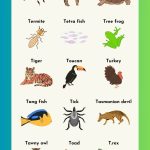
Animals that Start with T | Names, Pictures, Fun Facts
About, contact, privacy policy.
Best-selling author and English teacher Jackie Bolen has been talking ESL activities and games since 2015. The goal is to bring you the best ideas, lesson plans, and activity recommendations for your TEFL classes.
Get in touch: About + Contact
Privacy Policy and Terms of Use
Email: [email protected]
Address: 2436 Kelly Ave, Port Coquitlam, Canada
ESL Lesson Plan: Travel Plans
Robert Deutschman / Getty Images
- Resources for Teachers
- Pronunciation & Conversation
- Writing Skills
- Reading Comprehension
- Business English
- TESOL Diploma, Trinity College London
- M.A., Music Performance, Cologne University of Music
- B.A., Vocal Performance, Eastman School of Music
This English lesson plan helps reinforce vocabulary related to traveling by asking students to plan trips and excursions based on the profile of different groups of travelers. It is helpful to use local newspapers, especially newspapers that provide local events, to give students ideas of real places to visit. Most large cities have specialty newspapers that focus on local events and attractions available for free throughout the city.
Instructions for Teachers
The lesson begins with students deciding which types of groups are going to take a trip. Based on which group of travelers are going, students then use resources to plan out a short stay in a specific city or area of the country. Of course, you can choose to have students focus on distant locations. If you are teaching English in another country, it's probably best to vary this and focus on traveling abroad to allow the use of English place names.
Lesson Aims: Completing a small group task using the internet and other resources available in English, describing a travel destination and itinerary in detail
Activity: Planning a short trip to a specific location based on different traveler types
Level: Intermediate
Lesson Plan
As a class, discuss what types of locations, travel plans, etc. might be suitable for these different types of travelers:
- A married couple on a honeymoon
- Two friends who are attending college
- Two business people
As a class, discuss which resources students can use to make travel plans. There are many travel websites online that offer all the necessary tools for scheduling a trip. If available, use a projector and walk through the process of finding round trip flight tickets and hotels on a travel site.
Using the worksheet below, break students up into pairs or small groups (maximum of 4) assigning a pair of travelers to each group. Have students come up with detailed plans for each travel group. After each group has finished, have them present their travel plans to the entire class.
Variation: To extend this activity, ask students to create a presentation using PowerPoint or another similar software application. Students should find photos and write up bullet points for each of the activities to include in the presentation .
Plan a Trip to ___________ for the Following Travel Groups:
Honeymooners
Mary and Tim have just married and are in the mood for a great honeymoon to celebrate their eternal love for each other. Make sure to include lots of romantic options and some excellent meals to mark this happy event.
College Friends
Alan and Jeff are attending college together and are looking to have a wild week of fun and adventure. They love going to clubs and partying hard, but they don't have a lot of money to eat at fine restaurants.
Cultured Couples
The Andersons and the Smiths are married couples that have been friends for years. Their children are grown up and have their own families. Now, they enjoy traveling together and place a great deal of emphasis on visiting sights of cultural significance. They also love going to concerts and eating fine food.
Business People
These business people are interested in opening up a new company at your chosen location. They need to find out about the area, meet local business people, and discuss their proposal with local government.
Family with Children
The McCarthur family has three children aged 2, 5, and 10. They love spending time outdoors and have a limited budget for eating out. They aren't interested in entertainment, but the parents like to take the children to important museums to help with their cultural education.
Peter and Dan
Peter and Dan married a few years ago. They love to explore gay hot spots in cities they travel to, as well as do traditional sight-seeing tours. They are also gourmets who spend up to $500 on good meals, so they'd like to go to at least one top rated restaurant.
Travel Planning Sheet
Fill in the information to complete the vacation plans.
Dates / Times: Cost:
How many nights?: Cost:
Rental car yes/no? If yes, cost:
Trips / Sightseeing for the day: Cost:
Restaurants / Eating: Where?: Cost:
Evening entertainment: What / Where? Cost:
Add as many days as necessary to your travel planning sheet.
- Before You Decide to Become an ESL Teacher
- Multiple Intelligences in the ESL Classroom
- Future Tenses "Going to" vs. "Will"
- Standard Lesson Plan Format for ESL Teachers
- Lesson Plans on Tenses and Verb Conjugation
- 7 Free ESL Conversation Lesson Plans
- Top Lesson Plans for ESL and EFL
- ESL Lesson Plan on Stereotypes
- A VIP - Present Perfect Simple and Continuous
- ESL Grammar Lesson Plan: How to Use "Like"
- Presidential Elections: ESL Lesson
- Using Reading Comprehension in Lessons
- How to Build an ESL Class Curriculum
- Discussing Hobbies
- Writing English Drama Scripts in ESL Class
- Teaching Comparative and Superlative Forms to ESL Students

“The world is a book and those who do not travel read only one page.” Augustine of Hippo (354 – 430), theologian and philosopher
- April 8, 2021
- General English
Home » Travel
Latest lesson plans

LESSON OVERVIEW
This free ESL lesson plan on travel has been designed for adults and young adults at an intermediate (B1/B2) to advanced (C1/C2) level and should last around 45 to 60 minutes for one student.
Whether it’s exploring new places, or relaxing in familiar ones, everyone loves travelling. In fact, many people learning English are doing so for that exact reason. In the past, travelling to exotic locations was only for the super-rich. Now, with the expansion of budget airlines and cheap packages, the world is a lot more accessible to a lot more people. In this ESL lesson plan on travel, students will have the opportunity to discuss and express their opinions on issues such as how much they like travelling, the best places they have visited and different forms of travel.
This lesson plan could also be used with your students to debate these issues for World Tourism Day , which takes place in September. For more lesson plans on international days and important holidays, see the calendar of world days to plan your classes for these special occasions.
For advice on how to use this English lesson plan and other lesson plans on this site, see the guide for ESL teachers .
PRE-CLASS ACTIVITIES
Reading activity Before the English class, send the following article to the students and ask them to read it while making a list of any new vocabulary or phrases they find (explain any the students don’t understand in the class):
World of Wanderlust | The Top 25 Best Destinations in the World
The article provides descriptions of some of the most visited tourist destinations in the world. At the start of the class, hold a brief discussion about what the students thought about the article. Have the students visited any of these places? If so, what did they think about them? Which of the places on the list would they most like to visit and why? Can they think of any of the destinations that should not be on the list? Which other destinations should be on a list of the best destinations in the world?
Video activity To save time in class for the conversation activities, the English teacher can ask the students to watch the video below and answer the listening questions in Section 3 of the lesson plan at home. There are intermediate listening questions and advanced listening questions so teachers can decide which would be more appropriate for their students. Check the answers in the class.
The video for this class is called “The Point of Travel” by The School of Life which views travel as a kind of therapy that can help us with our emotional state of mind.
IN-CLASS ACTIVITIES
The focus in the class is on conversation in order to help improve students’ fluency and confidence when speaking in English as well as boosting their vocabulary.
This lesson opens with a short discussion about the article the students read before the class. Next, the students can give their opinion on the quote at the beginning of the lesson plan – what they think the quote means and if they agree with it. This is followed by an initial discussion on the topic including the benefits of travel, the student’s favourite holiday/vacation and the best places to spend a holiday/vacation in their country.
After this, students will learn some vocabulary connected with travel such as backpacking , off the beaten path/track and bucket list . This vocabulary has been chosen to boost the students’ knowledge of less common vocabulary that could be useful for preparing for English exams like IELTS or TOEFL. The vocabulary is accompanied by a cloze activity and a speaking activity to test the students’ comprehension of these words. This may also be a good time to explain the difference between travel, trip and journey , as these words are often confused by students
If the students didn’t watch the video before the class, they can watch it after the vocabulary section and answer the listening questions. Before checking the answers, ask the students to give a brief summary of the video and what they thought about the content.
Finally, there is a more in-depth conversation about travel. In this speaking activity, students will talk about issues such as the different types of holiday/vacation people like to go on, how much they like to plan for a trip and the attraction of solo travel.
After the class, students will write about their opinion of travel. This could be a short paragraph or a longer piece of writing depending on what level the student is at. The writing activity is designed to allow students to practise and improve their grammar with the feedback from their teacher. For students who intend to take an international English exam such as IELTS or TOEFL, there is an alternative essay question to practise their essay-writing skills.
DOWNLOAD LESSON PLANS

Did you find this lesson plan useful?
Your English Pal is a free resource to help fellow ESL teachers save time when preparing their classes. If these lesson plans have helped you, and you’d like to help keep the site free, please consider making a small contribution to help cover the site’s costs. Any help you can give is much appreciated!
2 thoughts on “Travel”
Hi I donante 5 dollars I can not download the lesson plan travel c1 c2
Hi Elsa. Thank you very much for your donation! You can download the lesson plan by clicking the PDF images at the bottom of the page (one for teachers and one for students). It should open in the new page and then you can click the download arrow at the top right to save them to your computer. Let me know if that works
Leave a Comment Cancel Reply
Your email address will not be published. Required fields are marked *
Save my name, email, and website in this browser for the next time I comment.
Copyright © 2023 Your English Pal
Privacy Overview
Expand your teaching through travel.
- Classroom Resources
- NGSS Storylines
- NGSS Storylines?? to Storylines!!
- Why Storylines Rock!
- Privacy Policy
- Terms & Services
- Affiliate Disclaimer
Adventure in the Classroom: Travel-Inspired Lesson Plan Format
- Posted by - Alyssa Weisenstein
- on - October 6, 2019

The volcanoes unit is one of my favorites to teach. Student buy-in is high because volcanoes are cool, but they have misconceptions that need to be debunked. How can I expect students to connect and truly understand concepts that are physically so far removed from them? Since I can’t bring them to the locations, the adventure has to start in the classroom. Follow this lesson plan format (with earth science examples!) to develop engaging travel-inspired learning.
During a volcano monitoring activity, students (freshmen in Southern Illinois – very far from any volcanoes) analyze the seismic activity on Hawaii to determine if a volcano eruption alert should be issued. They get all rowdy as the seismic activity increases and shout, “It’s going to blow!” “People are going to die, watch out!” The thing is though, Hawaii is formed by shield volcanoes, quiet eruptions of slow-moving lava, not Pompeii-style eruptions. Their vision of volcanoes is colored by what they’ve seen in movies and video games. Most have never even seen a real volcano.

An activity is not enough for students to fully visualize the environments where the content occurs. I’ll break down each step of the lesson plan format to develop engaging travel-inspired learning. Sections of the volcanoes unit will be used as examples throughout, but these are the same steps I follow for all units.
Goals of Travel-Inspired Learning
Student will:
- Create a connection to the content
- Envision processes and phenomena that occur throughout the world
- Develop as global citizens who acknowledge and respect different cultures
Getting Started
Don’t feel like you need to change an entire course or even unit to fit the destination-based learning model. Start by tying in a single lesson to a travel experience that really spoke to you. My destination-based lessons started with a simple two-minute story that connected to the content; it wasn’t part of an intentional planning process. I’ve developed the travel-inspired lesson plan format to help you transition to destination-based learning.
When you are passionate about what you’re teaching, students pick up on that. They’ll get a piece of the connection you’re sharing about your travel and how it connects to the content.
Exploration Passport
Each student has an Exploration Passport that they use for the entire course. Check out this article explaining Explorations Passports and for a FREE passport template. I do NOT let anyone take these out of the classroom. If they leave, you know they’re going to end up left in a locker, in a friend’s mom’s car, and who knows what other random places.
Exploration Passports include a United States map and a world map, so students know where we’re “adventuring.” This addition was made after an alarming number of students couldn’t find states on a U.S. map (including Illinois – where we live).
The pages within the passport are used as exit slips, learning reflections, and students’ own travel dreams.
Lesson Plan Format : Step-by-Step

1. Select Destination(s)
You know your content and you know the travels you’ve loved the most. It’s okay to pick more than one destination that meets the needs of the current concepts. Try to stick to one-to-three destinations, otherwise the presentation becomes too overwhelming and jumbled.
Start your lesson by sharing the adventure destinations for the day. Pictures, a short video, or a quick story are a great introduction. Try to use your own materials when possible. Have a selfie on location? Students enjoy seeing pictures of you at the destinations and you know how they love selfies. Now, students are hooked to your lesson and they’ll be engaged when you tie in the content.
Volcano Example: Hawaiian Islands – Shield volcanoes Sunset Crater Volcano National Monument in Arizona – Cinder cone volcano Eyjafjallajӧkull* in Iceland – Composite volcano (also called strato volcano) *No, I cannot pronounce the name of that volcano. This Icelandic person can though.

2. Show Destination(s) on the Map
Can you locate all 50 states on a U.S. map? Take a minute and try it out on this online quiz . How did you do? Too many high school students struggle with geography. I could no longer sit idly by and observe the geography illiteracy at the high school.
Show the U.S. and/or world maps with the locations, so students are oriented with your destinations. Encourage students to identify and mark the locations on their Exploration Passport maps.
Volcano Example:

3. Destination Information
Share brief information about the destinations with your students. This isn’t quite the time for content, but cultural information. I teach science, but I also have a responsibility for students to become well-rounded global citizens. I want people to be excited to learn about different areas of the world and the people who make those spaces unique.
Information Ideas
- Popular foods
- Popular activities
Volcano Example: Hawaii is the only state to have two official languages: English and Hawaiian. Although Iceland has the word Ice in the name, there is a lot of beautiful green space. Iceland has over 10,000 waterfalls. Arizona is not just a desert! Some areas of Arizona have mountains that are high enough in elevation to have annual snowfall. The average annual snowfall of Flagstaff is about 100 inches.

4. Share a Story
If you haven’t already, share a quick story about your experience at one of the destinations. Far off locations don’t seem real until you build a connection with them. You’re not sharing a novel here, so don’t sweat about it eating into your lesson time. Spending a moment engaging students will increase their overall learning better than more time can.
Volcano Example: Eyjafjallajӧkull last erupted in April 2010 over spring break and it released so much ash and dust that flights from Europe were grounded. A lady I worked with got stuck in Ireland for an extra week because she couldn’t fly out. “Shucks,” to being stuck on vacation for an extra week.
5. Connect with the Content
Now it’s time to connect your destinations to the content. I know there were several steps to get to this part, but by now your students are mesmerized by locations around the world and you have their attention. Quickly share with them where the lesson is headed.
Volcano Example: So, what do all of these locations have in common? They all were formed by volcanoes. However, volcanoes are not all the same. Some have violent eruptions, other quiet eruptions. Now, we’ll take a look at different types of volcanoes and how we can determine which type of volcano formed each destination.
This is the meat and potatoes of your lesson. The bulk of your time will be spent here diving into each of the concepts. Sometimes I finish the notes for a section in a day, other times it is spaced out over a week. You know your content better than anyone else, so you’ve got this part.
Volcano Example: You can access my exact unit slides! Teacher sharing is the best, so feel free to use them. COMING SOON!
7. Reflection/Exit Slip/Etc.
The final step of the lesson plan format is assessing students’ learning. It’s important for students to have time to process what they learned and share that information with you. I’d love to tell you I do this every day, but let’s be real, sometimes I’m just happy to make it through the hour unscathed. In all seriousness, we want to make sure our students are learning and quick formative assessments are a great way to do that. The strategy you select here does not really matter as long as you are doing something. Mix it up to keep students on their toes and play to different students’ strengths.
Ideas for Reflection/Exit Slip
- Students write answers to 2-3 main point questions
- One-word “what I learned”
- Draw images explaining a process
- Share something that surprised you or you didn’t know before
As you review students’ responses, quickly sort them into “got-it” or “not-quite” piles. Before starting the next day’s lesson, check-in with students who misunderstood a major concept.
Volcano Example: Check out the questions at the end of the volcano slides for the reflection questions. Students answer these questions in their Exploration Passports. I can look at them as students submit their passports or before the next class period. COMING SOON!
Pin it! Share it!

Alyssa Weisenstein
Leave a reply cancel reply.
Your email address will not be published. Required fields are marked *

Making Travel Plans
Travel English
In this lesson, Ellen and Martin Baxter make travel plans. Students listen to the couple’s conversation and practice it. The lesson includes a vocabulary and comprehension check.

Travel ESL Lesson Plans
- A2 Pre-Intermediate
- B1 Intermediate
- B2 Upper Intermediate
- C1 Advanced
- C2 Proficiency
Lesson times:
- 30 min
- 45 min
- 60 min
- 75 min
- 90 min
Lesson types:
- Free
- Premium
ESL Travel Lesson Plans
If you are looking for an ESL lesson plan on transportation and travel, look no more. You’re in the right place.

The seven summits
This lesson plan is created for students at the Upper-Intermediate level,…

Why we travel
This Upper Intermediate lesson plan focuses on expanding travel vocabulary and…

Check out Vienna!
This A2 ESL lesson plan aims to enhance students’ understanding of…

How safe is flying?
This C1 lesson plan focuses on expanding aviation vocabulary …

The geography of small talk
In this Intermediate lesson plan, students will engage in discussions about the nuances…

Chillin’ in Svalbard
In this Upper-Intermediate lesson plan, students will learn about must vs. have to. They will…

If you’re going to San Francisco…
In this Advanced ESL lesson, the students will learn about the culture of…
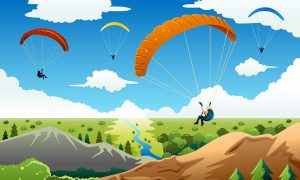
Paragliding to work
In this Intermediate lesson plan, students will talk about the most popular ways…

Exactly where are we now?
In this C2 lesson plan, students will practice vocabulary about travel and international borders. They…

Subscribe to premium content
Here you can find ESL lesson plans on transportation and travel for all difficulty levels, both free and premium.
Our offer – Travel English
We are offering ESL lesson plans for you to use during lessons with your students. Lessons are currently available at A2 and B1 levels , B2, C1 and C2. The duration of each lesson is between 30 and 90 minutes, depending on the plan you choose . This means that you can choose a lesson that suits your students’ level as well as your desired lesson length. The plans are designed to make your job as easy as possible and your teaching as effective as possible. Tired of “forcing” your students to speak? Try our lessons, they guarantee all kinds of discussions between students on topics they actually enjoy, since everyone travels sometimes.
Learn travel vocabulary
Our lesson plans focus on travelling, which gives your students a chance to learn language skills that they will most likely use in their lives. This can also make the lessons interesting – the students can share their experiences with travelling, stories about their travels, share their views on different countries, different cultures and various tourist attractions that they have seen. Lessons include current events, such as traveling during the pandemic, all kinds of situations that may occur at the airport, types of luggage you may bring and much more.
Lessons consist of content that should provoke discussion and prevent students from answering with a simple “yes” or “no”. This will help increase student confidence and also make the teacher’s job easier.
What else to expect
All our ESL Travel lesson plans comprise reading comprehensions, entertaining and inspirational videos, grammar rules and exercises, as well as various forms of discussion related to the topic.
Each week you can expect a new lesson to become available.
Currently we have lessons on travel related topics, such as:
- travelling abroad,
- travelling by planes,
- types of luggage,
- different types of travels and vacations,
- tourist attraction and different tourist destinations,
- life-on-the-road experience.
Our lessons in a few words
You can browse through our lessons to find the ones that suit your needs best. There is an overview for each lesson, so you know exactly what kind of vocabulary you will be teaching and what methods you will use.
Lessons include warm up discussions, videos for your students to watch, reading sections and grammar exercises. All of these elements add up to a complete lesson plan that will ensure your students go home with valuable new skills.

ESL LESSON PLAN:
Conversation: travel, download lessons.

(SV) Conversation Travel
(tv) conversation travel.
As requested by our members, we are now creating conversation lessons! Check out our new conversation lesson for beginners and please send some feedback to [email protected] ! We are sure that your beginner students will have a great time practicing some natural speech with guided prompts.
Lesson Overview
This lesson provides your beginner ESL students to practice their conversation skills. Take it slow - help them through all the questions. It might be a challenge for them, but speaking early on in their English studies will truly benefit them in the long run. Remember to correct common mistakes - they’ll thank you for it later!
This ESL travel lesson plan will force beginner students to come out of their shells and talk about where they would like to travel. Students have to complete a quick warm up and vocabulary exercise to make sure they learn new words at the beginning of the lesson. Thereafter, they have to complete multiple speaking exercises to practice the new vocabulary that they have learned.
We believe that it is very important for students to practice their speaking as much as possible. Which is why we have always included multiple speaking exercises in our lesson plans. However, we think that you and your students will love these extra practice lessons!
Activity layout:
- New vocabulary.
- Speaking exercise: Would you rather…?
- Speaking exercise: Discussion questions.
- Comprehension questions.
- Questions.
More from ESL Pals?
If you enjoyed this ESL General English lesson plan on Conversation: Travel be sure to check out our business curriculum , general english , kids' levels , and our grammar worksheets . And, if you want regular updates on ESL Pals, remember to follow us on Instagram and Facebook . Check out our free lessons here!
Related Lessons

How To Improve City Living
.png)
Join ESL Pals Today!
Access 1000+ esl lessons.

Multiple New Lessons Added Weekly
Join Our Community Today!

Search ESL Pals Lessons
Search over 1000+ Lessons from our extensive library.
Breaking News English Lesson: Travel Plans
Home | help this site, 35% of japanese people will never travel again (2nd january, 2023).
- 27-page lesson (40 exercises)
- 2-page MINI lesson
- All 3 graded readings
- North American & British English
- 20 questions
- Listen & spell
- 4-speed reading
- Text jumble
- The / An / A
- Prepositions
- Missing letters
- Initials only
- Missing words
The Reading / Listening - Travel Plans - Level 6
People are travelling internationally again after the hiatus that was caused by the coronavirus pandemic and the subsequent lockdowns. Many people are using the money they saved while borders were closed to embark on their bucket list trips. However, others are showing a reluctance to dust off their passports. A travel report from the Morning Consult website analyzed 16,000 surveys from people in 15 countries. The site found that 15 per cent of South Koreans and 14 per cent of Chinese and Americans, "never want to travel again". Those most unwilling to travel were the Japanese. The report stated that almost 35 per cent of Japanese respondents claimed they never wanted to leave Japan. There are many reasons for Japanese travellers being disinclined to venture overseas. One is a new-found desire to explore the culinary and cultural delights Japan has to offer. Many people travelled domestically during the pandemic and re-discovered their love of Japan's stunning nature and heritage. A Kyoto tour guide said: "I've been constantly amazed at my clients' reactions at seeing the sights of this city. I've never known Japanese people to be so engrossed in their history and tradition." Other reasons are cost and a desire to be green. Tokyo resident Kai Ueno said: "Flying isn't sustainable in this climate crisis. I'd much rather travel locally and spend the air fare on nicer hotels, restaurants and experiences in Japan."
Try the same news story at these easier levels:
Travel Plans - Level 4 or Travel Plans - Level 5
- https://www. cnbc.com /2023/12/19/dont-want-to-travel-many-in-japan-say-theyll-never-travel-again.html
- https://www. euronews.com /travel/2023/12/19/more-than-a-third-of-people-in-this-asian-country-dont-ever-plan-to-travel-again-heres-why
- https://go. morningconsult.com /State-of-Travel-and-Hospitality-Report-Download.html
Make sure you try all of the online activities for this reading and listening - There are dictations, multiple choice activities, drag and drop activities, sentence jumbles, which word activities, text reconstructions, spelling, gap fills and a whole lot more. Please enjoy :-)
Buy my 1,000 Ideas and Activities for Language Teachers eBook. It has hundreds of ideas, activity templates, reproducible activities, and more.
Take a look...
"Much has been said and written on the utility of newspapers; but one principal advantage which might be derived from these publications has been neglected; we mean that of reading them in schools." The Portland Eastern Herald (June 8, 1795)
"News is history in its first and best form, its vivid and fascinating form, and...history is the pale and tranquil reflection of it." Mark Twain, in his autobiography (1906)
"Current events provide authentic learning experiences for students at all grade levels.... In studying current events, students are required to use a range of cognitive, affective, critical thinking and research skills." Haas, M. and Laughlin, M. (2000) Teaching Current Events: It's Status in Social Studies Today.
- E-mail this to a friend
--> 1. TRAVEL PLANS: Students walk around the class and talk to other students about travel plans. Change partners often and share your findings. 2. CHAT: In pairs / groups, talk about these topics or words from the article. What will the article say about them? What can you say about these words and your life? travelling / pandemic / lockdown / bucket list / dust / passport / survey / website / overseas / culinary delights / nature / heritage / sights / climate crisis / air fare / hotel Have a chat about the topics you liked. Change topics and partners frequently. 3. OVERSEAS TRAVEL: Students A strongly believe overseas travel is the best education in the world; Students B strongly believe it isn't. Change partners again and talk about your conversations. 4. MY COUNTRY'S DELIGHTS: What are your country's delights? What makes them so good? Complete this table with your partner(s). Change partners often and share what you wrote. Delights Why? Nature Festivals Sights Food Museums Entertainment MY e-BOOK See a sample 5. PASSPORT: Spend one minute writing down all of the different words you associate with the word "passport". Share your words with your partner(s) and talk about them. Together, put the words into different categories. 6. DESTINATIONS: Rank these with your partner. Put the best destinations at the top. Change partners often and share your rankings. Kyoto London Rome Rio de Janeiro Nairobi Shanghai Delhi Sydney Vocabulary Paragraph 1 1. hiatus a. A number of experiences or achievements that a person hopes to have or do during their lifetime. 2. subsequent b. A person who replies to something, like supplying information for a questionnaire or responding to an advertisement. 3. embark c. A pause or break in continuity in a sequence or activity. 4. bucket list d. Begin a course of action or a journey. 5. reluctance e. Coming after something in time; following. 6. dust off f. Unwillingness to do something. 7. respondent g. Bring something out for use again after a long period of non-use. Paragraph 2 8. disinclined h. Start a (risky or daring) journey or course of action. 9. venture i. Of or for cooking. 10. culinary j. Put all of one's attention or interest on something. 11. stunning k. Being unwilling or reluctant. 12. heritage l. Conserving or keeping an environmental balance by avoiding using up natural resources. 13. engrossed m. Valued objects and qualities such as historic buildings and cultural traditions that have been passed down from previous generations. 14. sustainable n. Extremely impressive or attractive. Before reading / listening 1. TRUE / FALSE: Read the headline. Guess if 1-8 below are true (T) or false (F). The article says a hiatus caused coronavirus lockdowns. T / F Many people tripped over buckets during the coronavirus pandemic. T / F A website conducted a survey on people from 15 countries. T / F Chinese people were less reluctant to travel than South Koreans. T / F Many Japanese people wanted to explore Japan more. T / F A tour guide in Kyoto was amazed by the city's sights. T / F The tour guide said her clients were really interested in Japan's history. T / F Some Japanese people wanted to spend money on hotels in Japan. T / F 2. SYNONYM MATCH: Match the following synonyms from the article. hiatus subsequent embark analyzed unwilling venture delights stunning engrossed spend pleasures reluctant examined following travel absorbed break lay out start remarkable 3. PHRASE MATCH: (Sometimes more than one choice is possible.) after the hiatus that was the money they saved embark on their bucket showing a reluctance to 35 per cent of Japanese being disinclined to venture Japan's stunning nature I've never known Japanese people Flying isn't spend the air fare sustainable list trips respondents overseas and heritage caused by the coronavirus pandemic to be so engrossed while borders were closed on nicer hotels dust off their passports Gap fill Put these words into the spaces in the paragraph below. bucket unwilling dust respondents hiatus stated lockdowns surveys
People are travelling internationally again after the (1) _____________________ that was caused by the coronavirus pandemic and the subsequent (2) _____________________. Many people are using the money they saved while borders were closed to embark on their (3) _____________________ list trips. However, others are showing a reluctance to (4) _____________________ off their passports. A travel report from the Morning Consult website analyzed 16,000 (5) _____________________ from people in 15 countries. The site found that 15 per cent of South Koreans and 14 per cent of Chinese and Americans, "never want to travel again". Those most (6) _____________________ to travel were the Japanese. The report (7) _____________________ that almost 35 per cent of Japanese (8) _____________________ claimed they never wanted to leave Japan.
desire stunning locally venture sustainable constantly delights engrossed
There are many reasons for Japanese travellers being disinclined to (9) _____________________ overseas. One is a new-found desire to explore the culinary and cultural (10) _____________________ Japan has to offer. Many people travelled domestically during the pandemic and re-discovered their love of Japan's (11) _____________________ nature and heritage. A Kyoto tour guide said: "I've been (12) _____________________ amazed at my clients' reactions at seeing the sights of this city. I've never known Japanese people to be so (13) _____________________ in their history and tradition." Other reasons are cost and a (14) _____________________ to be green. Tokyo resident Kai Ueno said: "Flying isn't (15) _____________________ in this climate crisis. I'd much rather travel (16) _____________________ and spend the air fare on nicer hotels, restaurants and experiences in Japan."
Listening — Guess the answers. Listen to check.
1) People are travelling internationally again ______ a. after the high attics b. after the "hi" at us c. after the hiatus d. after the high eight us 2) that was caused by the coronavirus pandemic and ______ a. the subsequence lockdowns b. the subsequent lockdowns c. the subsequently lockdowns d. the consequent lockdowns 3) the money they saved while borders were closed to embark on their ______ a. bucket wrist trips b. bucket risk trips c. bucket lips trips d. bucket list trips 4) However, others are showing a reluctance to dust ______ a. oft their passports b. toff their passports c. of their passports d. off their passports 5) The report stated that almost 35 per cent of ______ a. Japanese responders claimed b. Japanese respond ants claimed c. Japanese respond dents claimed d. Japanese respondents claimed
6) There are many reasons for Japanese travellers being disinclined ______ a. to venture overseas b. to adventure overseas c. tour venture overseas d. to vent chair overseas 7) One is a new-found desire to explore the culinary ______ a. and cultural delights b. and culturally delights c. and cultural dill lights d. and culturally dates 8) and re-discovered their love of Japan's stunning ______ a. nature and hermitage b. nature end hermitage c. natural end heritage d. nature and heritage 9) the sights of this city. I've never known Japanese people to ______ a. be so embossed b. be so win grossed c. be sewing grossed d. be so engrossed 10) isn't sustainable in this climate crisis. I'd much rather travel locally and spend ______ a. the year fare b. there fare c. the air fare d. thee air fair
Listening — Listen and fill in the gaps
People are travelling internationally again after (1) ____________________ was caused by the coronavirus pandemic and the subsequent lockdowns. Many people are using the money they (2) ____________________ were closed to embark on their bucket list trips. However, others are showing a (3) ____________________ off their passports. A travel report from the Morning Consult website analyzed 16,000 (4) ____________________ in 15 countries. The site found that 15 per cent of South Koreans and 14 per cent of Chinese and Americans, "never want to travel again". Those most (5) ____________________ were the Japanese. The report stated that almost 35 per cent of Japanese (6) ____________________ never wanted to leave Japan.
There are many reasons for Japanese travellers being disinclined (7) ____________________. One is a new-found desire to explore the culinary (8) ____________________ Japan has to offer. Many people travelled domestically during the pandemic and re-discovered their love of Japan's stunning (9) ____________________. A Kyoto tour guide said: "I've been constantly amazed at my clients' reactions at (10) ____________________ of this city. I've never known Japanese people to (11) ____________________ in their history and tradition." Other reasons are cost and a desire to be green. Tokyo resident Kai Ueno said: "Flying isn't (12) ____________________ climate crisis. I'd much rather travel locally and spend the air fare on nicer hotels, restaurants and experiences in Japan."
Comprehension questions
- What was a hiatus in international travel caused by?
- What were closed that allowed people to save money?
- What kind of list was mentioned in paragraph one?
- How many people participated in the travel survey?
- Which nationality were the least willing to travel overseas?
- Where were Japanese people disinclined to venture?
- What did many Japanese people fall in love with again?
- What did a tour guide say Japanese people were engrossed in?
- What did a resident of Kyoto say was not sustainable?
- What would many Japanese prefer to spend their money on?
Multiple choice quiz
1) What was a hiatus in international travel caused by? a) fuel shortages b) coronavirus lockdowns c) terrorism d) ash from a volcano 2) What were closed that allowed people to save money? a) wallets b) banks c) shops d) borders 3) What kind of list was mentioned in paragraph one? a) a reading list b) a to-do list c) a bucket list d) a top-ten list 4) How many people participated in the travel survey? a) 16,000 b) 17,000 c) 18,000 d) 19,000
6) Where were Japanese people disinclined to venture? a) overseas b) into mountains c) into business partnerships d) into relationships 7) What did many Japanese people fall in love with again? a) themselves b) their partners c) Japan's nature and heritage d) flying 8) What did a tour guide say Japanese people were engrossed in? a) history and tradition b) food c) maps d) travel books 9) What did a resident of Kyoto say was not sustainable? a) population growth b) cars c) tourism d) flying
After reading / listening
1. WORD SEARCH: Look in your dictionary / computer to find collocates, other meanings, information, synonyms … for the words...
'travel' ________________ ________________ ________________ ________________ ________________ ________________ ________________ ________________ and 'plan' . ________________ ________________ ________________ ________________ ________________ ________________ ________________ ________________
• Share your findings with your partners.
• Make questions using the words you found.
• Ask your partner / group your questions.
2. ARTICLE QUESTIONS: Look back at the article and write down some questions you would like to ask the class about the text.
3. GAP FILL: In pairs / groups, compare your answers to this exercise. Check your answers. Talk about the words from the activity. Were they new, interesting, worth learning…?
4. VOCABULARY: Circle any words you do not understand. In groups, pool unknown words and use dictionaries to find their meanings.
5. TEST EACH OTHER: Look at the words below. With your partner, try to recall how they were used in the text:
caused bucket dust 16,000 unwilling claimed venture delights love amazed cost rather
Student survey
Write five GOOD questions about this topic in the table. Do this in pairs. Each student must write the questions on his / her own paper. When you have finished, interview other students. Write down their answers.
(Please look at page 12 of the PDF to see a photocopiable example of this activity.)

Discussion - Travel Plans
STUDENT A’s QUESTIONS (Do not show these to student B)
- What did you think when you read the headline?
- What images are in your mind when you hear the word 'travel'?
- What are your travel plans for this year?
- How important is it to travel?
- Did the coronavirus pandemic affect your travel plans?
- What do you think of your passport?
- How often do you dust off your passport?
- Why might people not want to travel overseas?
- What countries or places are on your bucket list?
- Should we avoid international travel to protect the environment?
STUDENT B’s QUESTIONS (Do not show these to student A)
- Did you like reading this article? Why/not?
- What do you think of when you hear the word 'plan'?
- What do you think about what you read?
- What do you think of international travel?
- What culinary and cultural delights are there in your country?
- How stunning is your country's nature?
- Do you think flying is unsustainable?
- Is it better to spend money on an air fare or a gorgeous hotel?
- Why do many people get the travel bug?
- What questions would you like to ask a frequent traveller?
Discussion — Write your own questions
(a) ________________ (b) ________________ (c) ________________ (d) ________________ (e) ________________
(f) ________________ (g) ________________ (h) ________________ (i) ________________ (j) ________________
Language — Cloze (Gap-fill)
People are travelling internationally again after the (1) ____ that was caused by the coronavirus pandemic and the subsequent lockdowns. Many people are using the money they saved while borders were closed to embark (2) ____ their bucket list trips. However, others are showing a reluctance to (3) ____ off their passports. A travel report from the Morning Consult website (4) ____ 16,000 surveys from people in 15 countries. The site found that 15 per cent of South Koreans and 14 per cent of Chinese and Americans, "never want to travel again". Those most (5) ____ to travel were the Japanese. The report stated that almost 35 per cent of Japanese respondents (6) ____ they never wanted to leave Japan.
There are many reasons for Japanese travellers being disinclined to (7) ____ overseas. One is a new-found desire to explore the (8) ____ and cultural delights Japan has to offer. Many people travelled domestically during the pandemic and re-discovered their love of Japan's (9) ____ nature and heritage. A Kyoto tour guide said: "I've been constantly amazed at my clients' reactions at seeing the sights of this city. I've never known Japanese people to be so (10) ____ in their history and tradition." Other reasons are cost and a desire to be green. Tokyo resident Kai Ueno said: "Flying isn't sustainable (11) ____ this climate crisis. I'd much (12) ____ travel locally and spend the air fare on nicer hotels, restaurants and experiences in Japan."
Which of these words go in the above text?
- (a) ratios (b) hiatus (c) cactus (d) herbivorous
- (a) of (b) by (c) at (d) on
- (a) lust (b) dust (c) bust (d) must
- (a) paralyzed (b) catalyzed (c) analyzed (d) hydrolyzed
- (a) unwilling (b) unwitting (c) unfailing (d) unfettering
- (a) claimed (b) clammed (c) calmed (d) clamped
- (a) vulture (b) couture (c) future (d) venture
- (a) culinary (b) veterinary (c) luminary (d) pulmonary
- (a) tuning (b) stunning (c) turning (d) attuning
- (a) embossed (b) en masse (c) engrossed (d) enmeshed
- (a) at (b) on (c) in (d) of
- (a) elect (b) rather (c) choice (d) prefer
Paragraph 1
- after the iasuth that was caused
- and the qeetnbussu lockdowns
- akberm on their bucket list trips
- showing a urecntecla to dust off their passports
- Those most liwunlnig to travel
- 35 per cent of Japanese enosesdtnpr
Paragraph 2
- travellers being lneiinidcsd to venture overseas
- explore the unlircay and cultural delights
- Japan's stunning nature and gretaehi
- eedsognrs in their history and tradition
- Tokyo idnerset Kai Ueno
- Flying isn't ablnseasiut
Put the text back together
(...) crisis. I'd much rather travel locally and spend the air fare on nicer hotels, restaurants and experiences in Japan." (...) of this city. I've never known Japanese people to be so engrossed in their history and tradition." Other (...) heritage. A Kyoto tour guide said: "I've been constantly amazed at my clients' reactions at seeing the sights (...) desire to explore the culinary and cultural delights Japan has to offer. Many people travelled ( 1 ) People are travelling internationally again after the hiatus that was caused by the coronavirus pandemic (...) and the subsequent lockdowns. Many people are using the money they saved while borders (...) domestically during the pandemic and re-discovered their love of Japan's stunning nature and (...) from people in 15 countries. The site found that 15 per cent of South Koreans and 14 per cent of Chinese and Americans, "never (...) were closed to embark on their bucket list trips. However, others are showing a reluctance to dust (...) off their passports. A travel report from the Morning Consult website analyzed 16,000 surveys (...) There are many reasons for Japanese travellers being disinclined to venture overseas. One is a new-found (...) 35 per cent of Japanese respondents claimed they never wanted to leave Japan. (...) want to travel again". Those most unwilling to travel were the Japanese. The report stated that almost (...) reasons are cost and a desire to be green. Tokyo resident Kai Ueno said: "Flying isn't sustainable in this climate
Put the words in the right order
- caused that was coronavirus . hiatus After the by
- closed . The they money borders while were saved
- dust off Showing to a passports . their reluctance
- most Japanese . the travel Those to unwilling were
- wanted claimed they Respondents to Japan . never leave
- One to reason desire explore . a is new-found
- people Many during the domestically travelled pandemic .
- been clients' my reactions . at amazed I've constantly
- be known I've people engrossed . so never to
- spend rather fare on hotels . the air I'd
Circle the correct word (20 pairs)
People are travelling internationally again after the cactus / hiatus that was caused by the coronavirus pandemic and the subsequently / subsequent lockdowns. Many people are using the money they spent / saved while borders were closed to embark / disembark on their bucket list trips. However, others are showing the / a reluctance to dust off / on their passports. A travel report from the Morning Consult website analysis / analyzed 16,000 surveys from people in 15 countries. The site found that 15 per cent of South Koreans and 14 per cent of Chinese and Americans, "never went / want to travel again". Those most / much unwilling to travel were the Japanese. The report stated that almost 35 per cent of Japanese respondents claimed / calmed they never wanted to leave Japan.
There are many reasons for Japanese travellers being declined / disinclined to venture overseas. One is a new-found desire / desires to explore the culinary and cultural delightful / delights Japan has to offer. Many people travelled domestically during / within the pandemic and re-discovered their love of Japan's stunning natural / nature and heritage. A Kyoto tour guide said: "I've been constantly amazed at / on my clients' reactions at seeing the sights of this city. I've never known Japanese people to be so / such engrossed in / on their history and tradition." Other reasons are cost and a desire to be / see green. Tokyo resident Kai Ueno said: "Flying isn't sustainable in this climate crisis. I'd much rather travel locally and spend the air fair / fare on nicer hotels, restaurants and experiences in Japan."
Talk about the connection between each pair of words in italics, and why the correct word is correct. Look up the definition of new words.
Insert the vowels (a, e, i, o, u)
P__pl_ _r_ tr_v_ll_ng _nt_rn_t__n_lly _g__n _ft_r th_ h__t_s th_t w_s c__s_d by th_ c_r_n_v_r_s p_nd_m_c _nd th_ s_bs_q__nt l_ckd_wns. M_ny p__pl_ _r_ _s_ng th_ m_n_y th_y s_v_d wh_l_ b_rd_rs w_r_ cl_s_d t_ _mb_rk _n th__r b_ck_t l_st tr_ps. H_w_v_r, _th_rs _r_ sh_w_ng _ r_l_ct_nc_ t_ d_st _ff th__r p_ssp_rts. _ tr_v_l r_p_rt fr_m th_ M_rn_ng C_ns_lt w_bs_t_ _n_lyz_d 16,000 s_rv_ys fr_m p__pl_ _n 15 c__ntr__s. Th_ s_t_ f__nd th_t 15 p_r c_nt _f S__th K_r__ns _nd 14 p_r c_nt _f Ch_n_s_ _nd _m_r_c_ns, "n_v_r w_nt t_ tr_v_l _g__n". Th_s_ m_st _nw_ll_ng t_ tr_v_l w_r_ th_ J_p_n_s_. Th_ r_p_rt st_t_d th_t _lm_st 35 p_r c_nt _f J_p_n_s_ r_sp_nd_nts cl__m_d th_y n_v_r w_nt_d t_ l__v_ J_p_n.
Th_r_ _r_ m_ny r__s_ns f_r J_p_n_s_ tr_v_ll_rs b__ng d_s_ncl_n_d t_ v_nt_r_ _v_rs__s. _n_ _s _ n_wf__nd d_s_r_ t_ _xpl_r_ th_ c_l_n_ry _nd c_lt_r_l d_l_ghts J_p_n h_s t_ _ff_r. M_ny p__pl_ tr_v_ll_d d_m_st_c_lly d_r_ng th_ p_nd_m_c _nd r_-d_sc_v_r_d th__r l_v_ _f J_p_n's st_nn_ng n_t_r_ _nd h_r_t_g_. _ Ky_t_ t__r g__d_ s__d: "_'v_ b__n c_nst_ntly _m_z_d _t my cl__nts' r__ct__ns _t s___ng th_ s_ghts _f th_s c_ty. _'v_ n_v_r kn_wn J_p_n_s_ p__pl_ t_ b_ s_ _ngr_ss_d _n th__r h_st_ry _nd tr_d_t__n." _th_r r__s_ns _r_ c_st _nd _ d_s_r_ t_ b_ gr__n. T_ky_ r_s_d_nt K__ __n_ s__d: "Fly_ng _sn't s_st__n_bl_ _n th_s cl_m_t_ cr_s_s. _'d m_ch r_th_r tr_v_l l_c_lly _nd sp_nd th_ __r f_r_ _n n_c_r h_t_ls, r_st__r_nts _nd _xp_r__nc_s _n J_p_n."
Punctuate the text and add capitals
people are travelling internationally again after the hiatus that was caused by the coronavirus pandemic and the subsequent lockdowns many people are using the money they saved while borders were closed to embark on their bucket list trips however others are showing a reluctance to dust off their passports a travel report from the morning consult website analyzed 16000 surveys from people in 15 countries the site found that 15 per cent of south koreans and 14 per cent of chinese and americans never want to travel again those most unwilling to travel were the japanese the report stated that almost 35 per cent of japanese respondents claimed they never wanted to leave japan
there are many reasons for japanese travellers being disinclined to venture overseas one is a new-found desire to explore the culinary and cultural delights japan has to offer many people travelled domestically during the pandemic and rediscovered their love of japans stunning nature and heritage a kyoto tour guide said ive been constantly amazed at my clients reactions at seeing the sights of this city ive never known japanese people to be so engrossed in their history and tradition other reasons are cost and a desire to be green tokyo resident kai ueno said flying isnt sustainable in this climate crisis id much rather travel locally and spend the air fare on nicer hotels restaurants and experiences in japan
Put a slash (/) where the spaces are
Peoplearetravellinginternationallyagainafterthehiatusthatwascause dbythecoronaviruspandemicandthesubsequentlockdowns.Manype opleareusingthemoneytheysavedwhileborderswereclosedtoembark ontheirbucketlisttrips.However,othersareshowingareluctancetodus tofftheirpassports.AtravelreportfromtheMorningConsultwebsiteana lyzed16,000surveysfrompeoplein15countries.Thesitefoundthat15p ercentofSouthKoreansand14percentofChineseandAmericans,"neve rwanttotravelagain".ThosemostunwillingtotravelweretheJapanese. Thereportstatedthatalmost35percentofJapaneserespondentsclaim edtheyneverwantedtoleaveJapan.TherearemanyreasonsforJapane setravellersbeingdisinclinedtoventureoverseas.Oneisanew-foundd esiretoexploretheculinaryandculturaldelightsJapanhastooffer.Many peopletravelleddomesticallyduringthepandemicandre-discoveredt heirloveofJapan'sstunningnatureandheritage.AKyototourguidesaid :"I'vebeenconstantlyamazedatmyclients'reactionsatseeingthesight softhiscity.I'veneverknownJapanesepeopletobesoengrossedintheir historyandtradition."Otherreasonsarecostandadesiretobegreen.To kyoresidentKaiUenosaid:"Flyingisn'tsustainableinthisclimatecrisis.I 'dmuchrathertravellocallyandspendtheairfareonnicerhotels,restaur antsandexperiencesinJapan."
Free writing
Write about the lesson page for 10 minutes. Comment on your partner’s paper.
_____________________________________________________________________________
Academic writing
International travel is the best education in the world. Discuss.
1. VOCABULARY EXTENSION: Choose several of the words from the text. Use a dictionary or Google's search field (or another search engine) to build up more associations / collocations of each word. 2. INTERNET: Search the Internet and find out more about this news story. Share what you discover with your partner(s) in the next lesson. 3. TRAVEL PLANS: Make a poster about travel plans. Show your work to your classmates in the next lesson. Did you all have similar things? 4. DOMESTIC TRAVEL: Write a magazine article about governments encouraging domestic over international travel. Include imaginary interviews with people who are for and against this. Read what you wrote to your classmates in the next lesson. Write down any new words and expressions you hear from your partner(s). 5. WHAT HAPPENED NEXT? Write a newspaper article about the next stage in this news story. Read what you wrote to your classmates in the next lesson. Give each other feedback on your articles. 6. LETTER: Write a letter to an expert on travel plans. Ask him/her three questions about travelling. Give him/her three of your ideas on the best places to visit. Read your letter to your partner(s) in your next lesson. Your partner(s) will answer your questions.
A Few Additional Activities for Students
Ask your students what they have read, seen or heard about this news in their own language. Students are likely to / may have have encountered this news in their L1 and therefore bring a background knowledge to the classroom.
Get students to role play different characters from this news story.
Ask students to keep track of this news and revisit it to discuss in your next class.
Ask students to male predictions of how this news might develop in the next few days or weeks, and then revisit and discuss in a future class.
Ask students to write a follow-up story to this news.
Students role play a journalist and someone who witnessed or was a part of this news. Perhaps they could make a video of the interview.
Ask students to keep a news journal in English and add this story to their thoughts.
Buy my 1,000 Ideas and Activities for Language Teachers eBook. It has hundreds of ideas, activity templates, reproducible activities for:
- Pre-reading / Post-reading
- Using headlines
- Working with words
- While-reading / While-listening
- Moving from text to speech
- Post-reading / Post-listening
- Discussions
- Using opinions
- Using lists
- Using quotes
- Task-based activities
- Using the central characters in the article
- Using themes from the news
Buy my book
(Please look at page 26 of the PDF to see a photocopiable example of this activity.)
Back to the top
Help Support This Web Site
- Please consider helping Breaking News English.com
Sean Banville's Book
- Download a sample of my book "1,000 Ideas & Activities for Language Teachers".

Talking about Travel Plans in the Future Simple

A fun lesson for beginner ESL students to learn the future simple, sequencers, vocabulary, and expressions for talking about travel plans using the Future Simple. Watch the ESL video about travel plans using the Future Simple Tense and use the ESL Printable and Digital storytelling travel flashcards to retell the story and practice using new vocabulary and expressions.
Warm Up Questions
- Where do you want to go on vacation?
- Make an example travel itinerary. What will you do each day?
- Do you prefer to relax or adventure?
- What countries have you been to?
ESL Video and ESL Listening Practice Travel Plans
Watch the following YouTube video:
ESL Listening Questions – Talking about Travel Plans using the Future Simple
- What time will Tony leave his house?
- What time will he depart from the airport?
- What time will he arrive in New York City?
- What time is Tony’s meeting?
- What will he do first when he arrives in New York?
- What will he do after dinner?
- What will Tony get for Samantha and the kids?
- When will Tony be back?
- What is the time difference between New York and LA?
ESL Printable and Digital Flashcards to Talk about Travel Plans
Use the following ESL printable flashcards to talk about travel plans in the future.

ESL Conversation about Travel Plans
Samantha: So, what is your plan for New York Tony?
Tony: Well, I will leave here at seven o’clock tomorrow morning. I will depart from LAX at 9:30. I will arrive in New York city at around 4:30. After that, I will check into my hotel.
Samantha: What time is your meeting?
Tony: My meeting is at 2:00 PM on Tuesday.
Samantha: So, what will you do tomorrow night?
Tony: I will have dinner at the hotel.
Samantha: What will you do after dinner?
Tony: I will walk around the city and do some sightseeing.
Samantha: Ahh. I wish I were going.
Tony: Me too, but I will buy you and the kids some souvenirs in New York.
Samantha: Excellent! We will be looking forward to it. When will you be back?
Tony: I will be back on Friday night at seven o’clock pm.
Samantha: Okay, great! What is the time difference between New York and LA?
Tony: There’s a three-hour time difference.
Samantha: Oh, I see!
ESL Gamification with Digital Badges and Stamps
Create microlearning steps to keep students motivated. Foster continuous learning with gamification by assigning badges and stamps to lesson steps and objectives. Choose from hundreds of ESL digital badges and stamps to gamify lessons and motivate students.

www.pocketpassport.com Questions? [email protected]
Reference: B2L7
Are You a Teacher?
Get access to over 500 lessons.
- Audio Files
- Downloadable PDF’s
- Digital Quizzes & Flashcards
- Grammar Tools
- Gamification Tools
- Add Student Accounts
- Create & Sell Courses
Are You a Student?
Improve your….
- Vocabulary & Idioms

- Privacy Policy
- Terms and Conditions
Customer Care is here to help!
Copyright 2022 Procketpassport.com.
All Right reserved.
- Full Access to Select Lessons
- New Lessons Added Every Week
- Free Lessons Include:
- PowerPoints
- Everything in Free +
- Full Access to ALL Lessons
- Lesson & Course Builder
- Easily Create Sales Pages
- Sell Courses Online
- Upload Your Own Content
- Student Accounts
- Premium Teacher & Student Tools
- Online Reservation System
- Feedback & Evaluation Tools
- Full Admin Tools
- Full Customization
- & Lots More!
Enter your email address below where you would like us to send the free sample!
Your privacy is protected..

Your Free Sample will arrive shortly. Have a great day!

Travel destinations
Level B1 / B2
Topic Lifestyle ESL lesson plans
Type General English
Lesson plan overview
This intermediate lesson plan is dedicated to the topic of travelling and travel destinations . It is packed with useful vocabulary and speaking activities and is sure to get your students talking! You can combine this lesson with “Phrasal verbs: travel” , “idioms: holidays”, “Dark tourism”, “ Accessible tourism “, “ Unusual hotels “, “ Winter festivals “, “ Solar eclipses and other natural phenomena “, and “ Tourist traps ”
Speaking: the lesson starts with a few conversation questions about travelling, which students dicuss in pairs or small groups.
Vocabulary: The next few activities introduce useful vocabulary. First, students learn a few advanced adjectives and collocations used to describe places ( rich history, breathtaking views, bustling city) . There are photos provided to make it easier to complete the activity. Next, students take a look at a few photos of different typical holiday activities ( sightseeing, scuba diving, chilling out, hiking etc. ) and they match the activities to the definitions given. To practise the target vocabulary, students complete a gap-fill exercise. Then students give examples of different places that correspond to the descriptions given (e.g. a place where you are expected to haggle).
Functional language: Students learn phrases that are used when evaluating our experiences ( e.g. “I had a blast”, “it sucked”, “It didn’t live up to my expectations”). Students need to place each phrase on a line depending on whether it is positive or negative. Then they practise asking each other about different experiences and responding with a phrase they have just learned.
Video: Students watch a promotional video: “3 incredible places to visit in 2022” . First, then match a few characteristics given to one of the 3 locations and then they watch the video to check their answers. The second task is a gap fill exercise, introducing 7 travel phrasal verbs. After completing the activity, students match the phrasal verbs to their definitions. The listening part of the lesson concludes with a short discussion about the places shown in the video.
Speaking: The last activity is a speaking activity: Students are asked to create a promotional campaign for their town/city, similar to what they watched. They are encouraged to use and practise the vocabulary from this lesson.
The printable conversation cards could be used for additional speaking practise either in the same class or in the next class, to revise the target vocabulary or to replace an activity from the worksheet. This lesson works well in combination with the lesson plans “ Should you take a gap year ” (FREE) as well as “ Idioms: the summer “.
Unlock these resources with one of our subscription plans
Teacher’s lesson plan
Student’s worksheet
Student’s interactive PDF
Conversation cards PDF

Pre-class activities
All video-based ESL lesson plans include online pre-class activities, which are FREE and can be completed without registration. Perfect for teachers who wish to embrace the blended learning approach. By providing students with resources and engagement opportunities before the actual class session, educators can foster active participation, enhance comprehension, and optimise in-class discussions.
The pre-class activities are optional : if you choose not to assign them, or your students don’t complete them, it will not disturb the flow of the class. You can find and review the pre-class activities for this lesson plan here:
To send the pre-class activities to your students, copy the link below.

In-class activities
Get Premium to unlock
Get Premium Plus to unlock

Additional resources
Each video-based lesson plan includes links to additional resources (videos and articles), which are FREE can be found online (in the pre-class activities page. These links aim to extend the learning experience, enabling students to connect classroom knowledge with real-world applications.
Not sure yet?
Try one of our FREE lessons plans
Login using email and password. If you forgot your passowrd reset it here
Forgot your password?
Not a member? Sign up now
Share this lesson plan with someone who will find it useful
Your browser is not supported
Sorry but it looks as if your browser is out of date. To get the best experience using our site we recommend that you upgrade or switch browsers.
Find a solution
- Skip to main content
- Skip to navigation
- Macmillan English
- Onestopenglish
- Digital Shop

- Back to parent navigation item
- Sample material
- Amazing World of Animals
- Amazing World of Food
- Arts and Crafts
- Mathematics
- Transport and Communication
- Teaching Tools
- Sustainable Development and Global Citizenship
- Support for Teaching Children
- Vocabulary & Phonics
- Spelling Bee Games
- Phonics & Sounds
- The Alphabet
- Onestop Phonics: The Alphabet
- Alphabet Booklet
- Interactive Flashcards
- Warmers & Fillers
- Young Learner Games
- Stories and Poems
- Fillers & Pastimes
- Fun Fillers
- Ready for School!
- Topics & Themes
- Young Learner Topics
- Young Learner Festivals
- Festival Worksheets
- Art and Architecture
- Business and Tourism
- Geography and the Environment
- Information Technology
- Science and Nature
- Topic-based Listening Lessons
- Cambridge English
- Cambridge English: Preliminary (PET)
- Cambridge English: First (FCE)
- Cambridge English: Proficiency (CPE)
- Cambridge English: Advanced (CAE)
- General English
- News Lessons
- Topics and Themes
- Beyond (BrE)
- Beyond: Arts and Media
- Beyond: Knowledge
- Go Beyond (AmE)
- Go Beyond: Arts & Media
- Go Beyond: Knowledge
- Impressions
- Macmillan Readers
- A Time to Travel
- Life & School
- Skills for Problem Solving
- Digital Skills for Teens
- Support for Teaching Teenagers
- Games Teaching Materials
- Business and ESP
- Business Lesson Plans
- Business Skills Bank
- Business Top Trumps
- Elementary Business Lessons
- HR Management
- Let's Talk Business
- Business News Lessons
- ESP Lesson Plans
- Career Readiness
- Professional Communication Skills
- Cambridge English: Business (BEC)
- Everyday Life
- Celebrations
- Live from...
- Live from London
- Discussion Cards
- Writing Lesson Plans
- Life Skills
- Support for Teaching Adults
- Vocabulary Lesson Plans
- Language for...
- Vocabulary Teaching Materials
- Macmillan Dictionary Blog
- Vocabulary Infographics
- Kahoot! Quizzes
- Blog Articles
- Professional Development
- Lesson Share
- Methodology: Projects and Activities
- Methodology: Tips for Teachers
- Methodology: The World of ELT
- Advancing Learning
- Online Teaching
- More from navigation items
Topics: How to use the lessons
- 1 Topics: How to use the lessons
- 2 Topics: Business
- 3 Topics: Christmas
- 4 Topics: Crime
- 5 Topics: Easter
- 6 Topics: Environment
- 7 Topics: Family
- 8 Topics: Food
- 9 Topics: Health
- 10 Topics: Hobbies
- 11 Topics: Identity
- 12 Topics: Jobs
- 13 Topics: Love
- 14 Topics: Museums
- 15 Topics: Music
- 16 Topics: Phobias
- 17 Topics: Politics
- 18 Topics: Sport
- 19 Topics: Travel
- 20 Topics: Weather
Topics: Travel
By Adrian Tennant
- No comments
Students are introduced to the topic of travel in this instalment of Adrian Tennant’s Topics series. The lesson is available at two language levels (Pre-intermediate and Intermediate) and gives students practice in reading, listening and speaking skills, as well as exercises focusing on grammar and vocabulary.
Topics: Travel: Pre-intermediate: Lesson plan
Topics: travel: intermediate +: lesson plan, topics: travel (pre-intermediate), topics: travel (intermediate +).
- everyday vocabulary
- Integrated Skills
- Intermediate
- Lesson Plan / Teacher's Notes
- Mixed Ability
- Pre-Intermediate
- Printable Worksheet
- Up to 60 mins
- Up to 90 mins
- Whole Class

Topics: Business

Topics: Christmas
Topics: crime.

Topics: Easter

Topics: Environment

Topics: Family

Topics: Food

Topics: Health

Topics: Hobbies
Topics: identity, topics: jobs.

Topics: Love
Topics: museums, topics: music, topics: phobias, topics: politics.

Topics: Sport

Topics: Weather
Related articles.

Communicative Language Learning: Designing a Travel Itinerary
Get your students talking about fun holiday activities while designing a travel itinerary in teams.

Language for… air travel (how to avoid delays at the airport)
By Tim Bowen
In this lesson, students will learn the necessary vocabulary for checking in for a flight and navigating airport security.
Theme-based expressions: travel
Head out on the open road with Tim Bowen as he introduces some travel-themed expressions.
No comments yet
Only registered users can comment on this article., more from topics.
Introduce your students to the topic of Easter while they practice reading, listening, and speaking.
Use this jolly instalment of Adrian Tennant’s popular series and get your students into the holiday spirit.
Students are introduced to the topic of museums in this instalment of Adrian Tennant’s Topics series. The lesson is available at two language levels (Pre-intermediate and Intermediate +) and gives students practice in reading, listening and speaking skills, as well as exercises focusing on grammar and vocabulary.
Join onestopenglish today
With more than 700,000 registered users in over 100 countries around the world, Onestopenglish is the number one resource site for English language teachers, providing access to thousands of resources, including lesson plans, worksheets, audio, video and flashcards.
- Connect with us on Facebook
- Connect with us on Twitter
- Connect with us on Youtube
Onestopenglish is a teacher resource site, part of Macmillan Education, one of the world’s leading publishers of English language teaching materials.
- Privacy Policy
- Cookie policy
- Manage cookies
©Macmillan Education Limited 2023. Company number: 1755588 VAT number: 199440621
Site powered by Webvision Cloud
- All Worksheets
- Index A - Z
- Business English
- 2018 Olympics
- Valentine's Day
- Intermediate
- Travel English
- Instant Lessons
- Phrasal Verbs
- Quick Fillers
- Reading Lessons
- Phone English
- Theme Lessons
- Games & Quizzes
- Present Tenses
- Past Tenses
- Present Perfect
- Future Tenses
- Most Popular
- Conditionals
- Prepositions
- Take a Tour
- Useful Links
- What's New?
Travel English Worksheets
Why not take a tour or check out our free sample worksheets ?

Still looking? Try our instant lookup. Just enter some keywords. Search Tips
- Membership is for an individual one-year subscription. In that time, you have unlimited access to all our worksheets. Classroom-based membership is $22 for a year. Online Extended Licence members can also use our worksheets in online lessons through Skype or as email attachments for just $30 a year.
- Standard and Extended Licence accounts are for the use of one teacher. Schools may purchase group accounts for teachers at a discounted rate.
- Standard and Extended Licence accounts allow only the account holder to log in and access the worksheets. Passwords must not be shared with other people. Accounts cannot be transferred to another person.
- Accounts do not automatically renew. However, you can renew your account at any time at a discount to our regular rates.
- Our materials are provided 'as is'. No warranty is made regarding the suitability or accuracy of the worksheets.
- All worksheets are in PDF format. Check that you are able to view Handouts Online Worksheets, by opening one of our free sample worksheets. It is your responsibility to check that you are able to open Handouts Online materials before joining.
- Copyright for the materials remains with Handouts Online. They must not be resold or reproduced in electronic form. Worksheets may not be uploaded onto other web sites / servers. Only members with the Online Extended Licence may send worksheets to students online via either Skype or as an email attachment. Worksheets can be printed out and photocopied for use in the account holder's lessons by all members.
- Payment is arranged through PayPal or 2Checkout. It's secure and instant. Payment can be made by credit card or debit card or with a PayPal account. Your address and card details are secure: they are not passed on to Handouts Online.
- Once Handouts Online has received confirmation of your payment, a confirmation email will be sent to you. Your membership will not begin until you have received this email.
- Use of Handouts Online materials signifies your agreement with these terms and conditions.
Become a member Join us and get instant access!
We have lots of free sample worksheets for you to print out and use in your classes today. Check them out and become a member today!
We have a huge library of ESL worksheets - all with teaching notes. Check us out!
Terms and Conditions
- Membership is for an individual one-year subscription. In that time, you have unlimited access to all our worksheets. Standard Online & Print Membership is $24 for a year for one teacher.
- Accounts are for the use of one teacher. Schools may purchase group accounts for teachers at a discounted rate.
- Membership allow only the account holder to log in and access the worksheets. Passwords must not be shared with other people. Accounts cannot be transferred to another person.
- Copyright for the materials remains with Handouts Online. They must not be resold or reproduced in electronic form. Worksheets may not be uploaded onto other web sites / servers. Members with the Online & Print accounts (formerly called Extended Licence) may send worksheets to students online via either Skype or as an email attachment. Worksheets can be printed out and photocopied for use in the account holder's lessons by all members.
Standard Membership
$22 / One Year
- Personal Use for One Teacher
- Print & Photocopy Worksheets
- Updates and New Releases
- Email Worksheets or Use in Skype™ Lessons
Online and Print Membership
$24 / One Year
- Print Worksheets to use in your classes
- Worksheets Without Notes / Answers
School Package
Discounted Rates
- An Account for Each Teacher
- All Standard Membership Benefits
- Option for Extended Membership
- Support for your Teachers with their Accounts
Questions? Take a Tour check our FAQ or get in touch . We're always pleased to help out!

Tim's Free English Lesson Plans
Use them, share them, comment on them, and share my link in return.
Travelling: Expressions and Discussion – My Ideal Holiday

Follow me on twitter @ RobbioDobbio
Just a quick note…
Before you use these materials… We’ve created a new podcast aimed at B2+ level English students and teachers alike. You can listen for free at our SoundCloud page below. You can download teacher’s notes to accompany them from our Facebook page or from this blog. All comments and feedback welcome! Give us a like and a share. https://www.facebook.com/2tspodcast/
Or listen on Spotify:
This is a vocabulary and conversation activity for higher levels (high B2+) on the subject of travelling. Download the student handout and powerpoint below:
Holiday Destinations – Powerpoint
UPDATE: I’ve combined this lesson plan with the “My Ideal Holiday” lesson.
In pairs students discuss the following questions
- What’s the best place you’ve ever visited?
- How often do you travel?
- Do you have any trips planned for the near future?
Travel Expressions
Give out the handout. Have students read the texts and decide who they are most similar to. Let them share their ideas in pairs or small groups and give reasons for their answers.
Meaning Match
Have students match the expressions in bold with the definitions at the bottom.
- get the travel bug.
- catch some rays
- travel light
- at the crack of dawn
- savour local delicacies
- sit and watch the world go by
- feel right at home
- experience a culture shock
- watch one’s back
- a culture vulture
- have everything planned out
- travel on a shoestring
- see how the mood takes one
- off the beaten track
Students complete the sentences with the correct expressions:
Students discuss the following questions in groups of 3.
- Do you travel light ? If so, how do you decide what to pack?
- You have to watch your back when you’re travelling alone; there are a lot of dangerous people out there. Do you agree?
- Which place that you’ve visited was the biggest culture shock ? Where did you feel right at home ? Why?
- Do you normally travel on a shoestring or live it up ? How can you save money while travelling? Would you consider hitchhiking or couchsurfing?
- Have you got the travel bug ? Have you got itchy feet ? If so, where’s next on the list?
- Do you like to pack a lot in/have a full plate or see how the mood takes you when you’re travelling?
- What’s the perfect place to sit and watch the world go by for you?
- How important is it for you to catch some rays when you’re on holiday?
- How do you choose a holiday destination? Are you a culture vulture ?
Holiday Destinations Discussion
Project the powerpoint, tell students that they are going to choose a holiday destination in their groups from a number of popular places around the world.
Show them the second slide and have them copy down the different expressions:
Then have students discuss the different holiday destinations in groups and decide on one which the whole group would like to visit.
Students could write a CAE/CPE style Proposal composition about the process of deciding on a holiday destination for the group. They could evaluate the different merits and drawbacks of three of the destinations from the powerpoint and recommend one as the destination for an end of year trip.
Alternatively they could write a review of a holiday to one of the places.
Share this:
Author: Tim Warre
Barcelona based English Teacher, blogger and sometime actor and director. View All Posts
9 thoughts on “ Travelling: Expressions and Discussion – My Ideal Holiday ”
- Pingback: Travelling: Expressions and Discussion | ESL re...
Hi there Thanks a lot the information was useful I have used them for my class and it really worked Thank you indeed Peyman
Great lesson plan! thank you so much
These are excellent ideas for a Lesson Plan, I will definitely use it when I start my teaching career. Thank you Tim Regards Beverly Liedtke I don’t have a website only email: [email protected]
I will try these in my class
Thanks Tim It’s great and I will use them too …
Namaste Ranger Yogini B
South Africa [email protected]
Stunning vocabulary lesson plan, I think my pupils will enjoy doing such activity. They are useful expression in every day life.
Hi this lesson on a high level.
Quite a masterpiece of art. I as a student , will greatly benefit from this .
Leave a Reply Cancel reply
Discover more from tim's free english lesson plans.
Subscribe now to keep reading and get access to the full archive.
Type your email…
Continue reading
- Skip to global NPS navigation
- Skip to the main content
- Skip to the footer section

Exiting nps.gov
Teaching with museum collections lesson plans.

Antietam National Battlefield
- Antietam: The Aftermath

Arlington House - The Robert E. Lee Memorial
- Family Life at Arlington House
- "From Slavery to Freedom: Different Journeys to Liberty"
- Sitting in Robert E. Lee's Writing Chair

Bandelier National Monument
- Ancestral Pueblo Tools
- Designing Civilian Conservation Corps Style Tinwork and Woodcarving
- Community Roles of Pueblo Peoples: Past and Present
- Exploring Cultural Continuity Through Pottery
- A New Deal for Artists
- Magical Collaborations
- Passing Traditions Through Time

Carl Sandburg Home National Historic Site
- Always the Young Seekers: Carl Sandburg, The Early Years
- Carl Sandburg: Collector of Life in Word and Song
- Carl Sandburg’s Rock: The Connemara Home
- Carl Sandburg: Visionary Poet
- Working and Writing for a Living at Connemara

Clara Barton National Historic Site
- Clara Barton, Founder of the American Red Cross, Pioneer and Innovator
- Clara Barton Needs You!
- Preservation at Clara Barton National Historic Site

Death Valley National Park
- Native Tools for Food Harvest
- Who is Death Valley Scotty?

Eisenhower National Historic Site
- The Eisenhower Farm: Leaving the Land Better Than He Found It!
- Eisenhower's Presidency
- I Like Mamie!

Eleanor Roosevelt National Historic Site
- A Few of Eleanor’s Favorite Things: Learning about History by Looking at Objects

Frederick Douglass National Historic Site
- Frederick Douglass' Hat
- Forward March: Continuing Frederick Douglass' Footsteps

Gettysburg National Military Park
- Life of a Civil War Soldier
Grant-Kohrs National Historic Site
- A Brand is Forever
- Cowboy Doctor
- Home on the Range

Guilford Courthouse National Military Park
- The American Revolution, A Revolution of Possibilities: Politics, Economy, and Society

Hampton National Historic Site
- On the Move: The Travel Experiences of Americans in the Nineteenth Century

Harry S Truman
- The Etiquette of Calling
- The Many Hats of Harry S Truman

Lincoln National Historic Site
- Lincoln's Legal Career
- Lincoln- The Candidate: “The Taste is in My Mouth a Little”
- Reminder of the Past, Lincoln Keepsakes
- The Abraham Lincoln Home in Springfield, IL
- Mary Todd Lincoln and the Boys

Manzanar National Historic Site
- Traveling Beads: American Indian Currency
- The Language of Confinement: Writing from Manzanar

Maggie L. Walker National Historic Site
- Dinner Discussions at Maggie Walker’s House

Nez Perce National Historical Park
- Fashion Detective – An Investigation of Continuity and Change in Nez Perce Country
- Nez Perce Flutes
- The Seasonal Round: a strong influence on the Daily Pulse of the Nez Perce
- Daily Life in the Ancient Times of the Nez Perce
- Historic Nez Perce Clothing and Adornment
- Nez Perce Spirituality: an integrated arts; literature, visual art, music and dance unit
- Native American Games: Nez Perce Stick Game (Lopmix game)
- Trade and Transportation

Prince William Forest Park
- Nurturing the Human Crop

Treasured Landscape s
- Lesson 1: The National Park System: America’s Best Ideas
- Lesson 2: Explore Your World!
- Lesson 3: For the Record
- Lesson 4: The Campaign for Yellowstone
- Lesson 5: The Bull Pen: A Photographic Comparison
- Lesson 6: Crafting Your Campaign

Tuskegee Institute National Historic Site

Valley Forge National Historical Park
- Lesson 1: Daily Life at Valley Forge
- Lesson 2: In Their Own Words
- Lesson 3: Von Steuben Makes an Army
- Lesson 4: Remember the Ladies
- Lesson 5: The Economy of War

Vicksburg National Military Park
- Life Aboard the USS Cairo
- Naval Warfare during the Civil War
- The Army and Navy: Significant Factors in the Vicksburg Campaign During the Civil War
- The Siege of Vicksburg
- William T. Rigby and His Walking Cane
Sort By: Relevance Recently Updated Date Released Title
Show 10 40 per page
Last updated: August 23, 2024
Travel is the only thing you buy that makes you richer
- Writing Skills
Vocabulary - travelling

This is a standalone lesson but it can also be used as part of the set titled:
- Let’s go around the world
LESSON OVERVIEW
With this travel worksheet, pre-intermediate students can talk about how travelling changes them and learn some useful vocabulary. They also read a short text , watch a video about dream travel destinations and write an email.
VOCABULARY & READING
The first activity in this travel worksheet is a brainstorming activity in which students discuss if and how travelling can change people. Then, they do a vocabulary task in which they need to move some words (e.g. abroad, foreign, imagination ) from the wrong sentences to the correct ones. After that, students read the article about how travelling changes people. One person from a pair reads the first half of the article, and the other person reads the second half. Next, they share what they learned and discuss if they agree with the ideas mentioned in the article (e.g. travelling makes you trust people more, travelling makes you more creative ).
VIDEO & SPEAKING
The second part of the worksheet begins with a video lead-in activity. Students look at a list of countries and cities and discuss if they have been to those places and what they know about them. Then, they watch the video in which people talk about the places they would like to visit, and put the places from the list in the order they hear them . Before the second viewing, students read five gapped sentences from the video and think what words might be missing. After that, they watch the video and check the words they came up with. The teacher could decide to just play the audio during this activity. Having watched the video, students discuss several questions referring to travelling , e.g. their travel experiences, different cultures, foreign languages. When speaking, they try to use the words from the lesson. The last part of this travel worksheet for pre-intermediate students includes a writing task. Students have to write an email to a friend describing their dream holiday. There are some questions to guide them.
Subscribe to unlock these and many other Standalone lesson with the Premium plan
Leave a Reply Cancel reply
You must be logged in to post a comment.
Nice lesson and nice video – it”s manageable. But not a lesson that can be done easily in just 60 minutes…The writing activity alone takes a quarter of that. Perhaps it’s more a 90 minute class.
Thanks for your comment! We always gather feedback like that and then adapt the expected lesson time if we see that we miscalculated it.
Very interesting lesson
Browse other materials recommended for you

Let’s go on a date!
Students discuss different types of dating, how it has changed over the years, and brainstorm hypothetical dating scenarios. They explore opinions, learn vocabulary, and watch and discuss a video about speed dating.

Sharing experiences (Present Perfect and Past Simple)
With this lesson, students discuss the topics people talk about when they first meet. They also practise Present Perfect and Past Simple, watch a video about people who have just met and do a role play activity.

What to do when you’re stressed
Talk about how to stop worrying about a problem with this lesson! Students discuss stress issues, watch a short video on tips about how to take your mind off problems and practise advice structures.

It’s such a lovely place! (so and such)
With this lesson, students talk about travel experiences, watch a short video about the capital city of Ghana and practise ‘so’ and ‘such’ structures. They also share their personal experiences and discuss the advantages of different travel options.

Posh and fancy (Past Simple and Continuous practice)
Engage in revising Past Simple and Continuous and discussing fancy experiences with this lesson! Students explore vocabulary to talk about the topic, watch a humorous ad for a ketchup brand and create interesting stories.

It’s your special day!
With this fun lesson, students talk about celebrations and their personal experiences. They watch and discuss a video about celebrating someone’s birthday on a budget and discuss birthday celebration ideas. Students also practise phrases related to birthdays.

Shopping experience
In this speaking lesson, students talk about their shopping preferences and experiences. They also practise vocabulary related to the topic, assess situations related to shopping and watch a video about a second-hand department store.

My pet makes me happy
Engage students in fascinating discussions as they explore how pets influence our lives, master the structure ‘make + object + adjective’ and dive into a news story video on pets in the workplace in this flipped classroom lesson!

Ways to relax
In this lesson about free time, students talk about the things they find stressful and what they do to relax. They also watch a video about an unusual pastime activity.
PLAN DE LECCIÓN PARA PROFESORES/AS DE INGLÉS
Travel plans.

Nivel: Pre-intermediate (A2-B1)
Tipo de inglés: General English
Etiquetas: transport travel and leisure going to + infinitive Vocabulary and grammar
Publication date: 16/06/2014
In this dialogue-based lesson plan, students review the structure 'going to' + infinitive for stating plans and making predictions.
Travel-plans-Ex3
Transcripción
- subtitles off
- captions off
7 Comentarios
I did love the worksheets, but I think the listening could be more natural and authentic.
I love all of your lessons - EXCEPT sometimes the pictures you choose cannot be clearly seen as to what they are.
I have to agree with Hassan. I understand that the 'actors' can't speak too quickly at this level, but it's all pretty stilted and lacks realistic feeling and tone. And by the way, when typing a comment the text is extremely small, smaller than when it's posted.
Love the worksheets but a number of students have queried the clarity of the pictures as well as the small font size. There was a way to improve this is would make the materials even better.
Thanks for the worksheet it was interesting.
Thank you so much for sharing it. It is useful
I agree about font size - much too small particularly when using smaller screens like a tablet or mobile phone. While I usually like Linguahouse lessons, I don't think the conversations in this one are very realistic. In many cultures, strangers wouldn't ask personal questions. They might ask for information like directions but that would be the end of the dialogue.
Deja un Comentario
Ficha de ejercicios para estudiantes
Plan de lección para profesores/as
Descargar audio
Descargar video
Guardar lección en
TravelPlansDialogueAE.mp3
PLANES DE CURSO
Este plan de curso integral cubre todas las necesidades lingüísticas - auditivas, de rol y de desarrollo de vocabulario.
Fichas de ejercicios en el plan de curso English for Work and Life
Tipo de inglés: General English Nivel: Pre-intermediate (A2-B1)
Tipo de inglés: Business English Nivel: Pre-intermediate (A2-B1)
Haz que tus clases sean imposibles de olvidar
¿Sabías que tus estudiantes pueden repasar la lengua meta de nuestras fichas de ejercicios con nuestra app de tarjetas de aprendizaje Expemo ? Para hacérselo saber, solo ingresa debajo sus direcciones de correo electrónico (si ingresas más de una dirección, sepáralas con comas).
- Lesson Plans
- Teacher's Guides
- Media Resources
Unveiling the Past: Analyzing Primary Documents on Harry Washington's Life
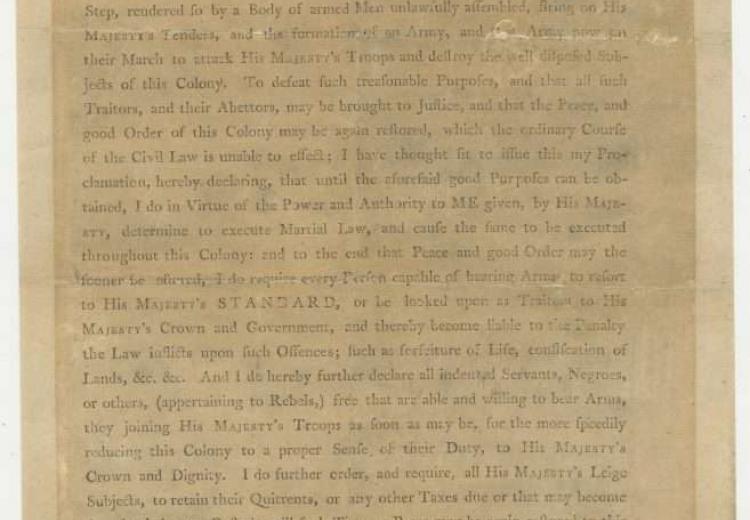
A photo copy of Lord Dunmore's Proclamation.
Source: Encyclopedia Virginia
This lesson plan highlights the story of Harry Washington, a man formerly enslaved by George Washington. Harry took his fate into his own hands and seized his freedom by fighting with the British Royal Artillery during the American Revolutionary War. This opportunity, provided by Dunmore’s 1775 Proclamation , offered a path to freedom to enslaved people willing to fight for the British cause. For students, this lesson offers a reframing of the “Underground Railroad” and expands their understanding of freedom-seeking during the Revolutionary period. In an activity of revealing mystery, students work intimately with a host of primary sources including maps, letters, ship manifests, and settlement records to develop a timeline of Harry’s life from enslavement to liberation.
A companion story map of Harry Washington's life is also available from the National Park Service .
This resource is a product of Claiming Freedom in the Revolutionary Era – a partnership of the National Underground Railroad Network to Freedom, the National Park Service, the National Endowment for the Humanities, the National Park Foundation, and the Greening Youth Foundation.
Guiding questions.
How do historical records help individuals doing family research?
What challenges might historians face when piecing together a timeline based on available primary sources?
Why is constructing a timeline an effective method for visualizing and comprehending the sequence of events in an individual's life?
Learning Objectives
Use and analyze primary sources to trace an individual through history.
Construct a timeline of an individual’s life.
Compose a personal letter communicating their findings as a historian.
Lesson Plan Details
In 1775, Lord Dunmore declared that any indentured servant or enslaved person who fought for the British during the Revolutionary War would be considered free. This led to the formation of the Ethiopian Regiment , which grew to nearly 800 members before being disbanded in 1776. The Black Pioneers, a non-combat group, emerged from the remnants of the Ethiopian Regiment and provided support services to the British Royal Artillery. Harry Washington rose to the rank of corporal and fought with the Black Pioneers from approximately 1776 to 1783.
After the American victory in the Revolutionary War, the losing side couldn't free the enslaved. Many seeking freedom fled to British ships. The British granted certificates of freedom to those who aided them, but these certificates had limitations.
It wasn’t until the spring of 1783 that the British began evacuating newly freed people out of the United States. The record of this exodus is kept in the Book of Negroes, which took note of each individual boarding a ship, their age when they escaped their enslaver and their intended destination. These British ships had several destinations spanning the British empire including Nova Scotia, Jamaica, the Bahamas, and England itself. Free people would go on to establish their own colonies in these areas.
D2.Geo.2.9-12. Use maps, satellite images, photographs, and other representations to explain relationships between the locations of places and regions and their political, cultural, and economic dynamics.
D2.His.3.9-12. Use questions generated about individuals and groups to assess how the significance of their actions changes over time and is shaped by the historical context.
D2.His.4.9-12. Analyze complex and interacting factors that influenced the perspectives of people during different historical eras.
D2.His.5.9-12. Analyze how historical contexts shaped and continue to shape people’s perspectives
This activity can be accessed online or via hard copies. You are encouraged to pre-plan the groups you’ll put them in. Strategically grouping students will aid in the smoothness of the activity overall. Groups are recommended to consist of 3-5 students.
It is recommended that each group print at least 2 copies of each document. This will allow most, if not all, group members to look at the document(s) together and discuss them.
Skill-wise, your class should be familiar with analyzing and extracting information from primary sources. If you haven’t explicitly taught primary source analysis, there is a Primary Source Analysis lesson plan available that covers that.
Content-wise, your students should be familiar with Dunmore’s Proclamation and what that potential meant to enslaved people during the Revolutionary Era. There is a slide deck provided to provide some background information.
Students will be reading through a variety of primary documents provided below within the Materials & Media. Instructions specific for students' use are titled "Student Activity Worksheet—Harry Washington" and "Student Activity Instructions—Harry Washington."
You have three options for how you would like to run this primary source activity. Option A (whole class directed): You may opt to pull up each document on a screen or have students do one document at a time as a whole class activity, with you leading them through each question. Option B (mixed independent): You can opt to have students come to you to gather the documents. This option lets you see how quickly students are going through the materials. If you decide to go this route, it is suggested that one student be the speaker of their group to come up for the next piece. This minimizes chaos and overwhelm on your end. Option C (mostly independent): You can leave students with the document folders (or paper/binder clipped) and they can pace themselves. Either option works; choose what works best for the class you’re teaching.
Students may use the worksheet to show their learning as well.
Questions: At the end of research, students can write a mock email to Sarah, Harry’s descendant, explaining what happened to Harry during his lifetime. Consider using the following questions and your worksheet to guide your email.
Approximately when was Harry born?
What did Harry do during the Revolutionary War?
What happened to Harry at the end of the Revolutionary War? Where did he go? How did he get there?
- If students are curious about what happened to Harry post-Nova Scotia, here’s a brief blurb: Harry’s story does not end in Nova Scotia! Nova Scotia came with its own obstacles. White Loyalists were upset that they had to compete with free Blacks for work in Nova Scotia. Shelburne had their own race riots in 1784, which was 10 days of violence mostly targeted toward the free Black population. If you want to read more in-depth, here’s the Canadian Encyclopedia entry . In 1791, a representative from the Sierra Leone Company came to see if any free Blacks were interested in coming to Freetown to create a settlement. They were told the settlement would be close to major trade routes and waterways, and anyone coming would be given land grants. When Harry and hundreds of other free Blacks signed up for this journey, it became clear this wasn’t the case. They faced similar obstacles to those in Nova Scotia and, somewhat, the United States. The new settlers could work for wages, however, a large portion of them went to the Company. They were told when and how to work and were penalized if they didn’t follow instructions. Upset with this treatment, and continued quasi-enslavement, the settlers (including Harry) rose up against the Sierra Leone Company in 1800. This revolution was largely unsuccessful and caused upwards of 40 men, one of which was Harry, to be exiled. It is at this point in the historical record that Harry disappears
Materials & Media
Educator instructions - harry washington, student activity instructions - harry washington, student activity worksheet - harry washington, harry washington background knowledge slide deck, harry washington primary documents, related on edsitement, primary and secondary sources: foundations of historical research, afro atlantic: paths from enslavement, afro atlantic: mapping journeys, digital humanities and online education.

IMAGES
VIDEO
COMMENTS
If you need some fresh, new ideas for the ESL travel and holiday unit that you can find in most textbooks, then you're in the right place. We'll share our top ideas for games and activities, along with travel vocabulary, worksheets and lesson plans. Let's get to the best ESL holiday activities. ESL holiday and travel-themed activities.
Updated on May 30, 2019. This English lesson plan helps reinforce vocabulary related to traveling by asking students to plan trips and excursions based on the profile of different groups of travelers. It is helpful to use local newspapers, especially newspapers that provide local events, to give students ideas of real places to visit.
This free ESL lesson plan on travel has been designed for adults and young adults at an intermediate (B1/B2) to advanced (C1/C2) level and should last around 45 to 60 minutes for one student. Whether it's exploring new places, or relaxing in familiar ones, everyone loves travelling. In fact, many people learning English are doing so for that ...
Travel plans. Share. Level: Pre-intermediate (A2-B1) Type of English: General English. Tags: transport travel and leisure going to + infinitive Vocabulary and grammar. Publication date: 06/16/2014. In this dialogue-based lesson plan, students review the structure 'going to' + infinitive for stating plans and making predictions.
IntroductionThis lesson offers a variety of activities based on three round the world travellers: a cyclist, a runner and a teenage sailor. The lesson begins with a warm-up activity that introduces the topic and revises country names. Task 1 presents vocabulary that appears in three texts about the travellers. In Tasks 2 and 3, students read the texts for specific information. Task 4 is a role ...
With this lesson, students discuss travel preparation, watch a video about tips on packing and talk about potential challenges when travelling. You can also do a vocabulary activity to revise vocabulary related to the topic. Unlimited Plan Show. A2 / Pre‐Intermediate | B1 / Intermediate. Flipped Lesson 60 min.
The pages within the passport are used as exit slips, learning reflections, and students' own travel dreams. Lesson Plan Format: Step-by-Step 1. Select Destination(s) You know your content and you know the travels you've loved the most. It's okay to pick more than one destination that meets the needs of the current concepts.
Travel English. Int. Teens & Adults. In this lesson, Ellen and Martin Baxter make travel plans. Students listen to the couple's conversation and practice it. The lesson includes a vocabulary and comprehension check. Launch tasks.
With ready-made lesson plans from English4Tutors, teachers save significant prep time. This allows teachers to direct their energy toward student interaction and feedback, making lessons more personalized and impactful. Diverse Topics: The realm of travel is vast, and English4Tutors ensures this vastness is reflected in their lesson plans.
Our offer - Travel English. We are offering ESL lesson plans for you to use during lessons with your students. Lessons are currently available at A2 and B1 levels, B2, C1 and C2. The duration of each lesson is between 30 and 90 minutes, depending on the plan you choose. This means that you can choose a lesson that suits your students' level ...
In this lesson, students develop their conversational skills by talking about travel experiences. The lesson starts with a speaking task about general preferences for travelling. The students then look at two stories and make predictions about the events and identify positive and negative factors that can influence a travel experience. The students then play a word game to identify and ...
This ESL travel lesson plan will force beginner students to come out of their shells and talk about where they would like to travel. Students have to complete a quick warm up and vocabulary exercise to make sure they learn new words at the beginning of the lesson. Thereafter, they have to complete multiple speaking exercises to practice the new ...
English News Lessons: Free 27-Page lesson plan / 2-page mini-lesson - Travel Plans - Handouts, online activities, speed reading, dictation, mp3... current events.
A fun lesson for beginner ESL students to learn the future simple, sequencers, vocabulary, and expressions for talking about travel plans using the Future Simple. Watch the ESL video about travel plans using the Future Simple Tense and use the ESL Printable and Digital storytelling travel flashcards to retell the story and practice using new ...
Lesson plan overview. This intermediate lesson plan is dedicated to the topic of travelling and travel destinations. It is packed with useful vocabulary and speaking activities and is sure to get your students talking! You can combine this lesson with "Phrasal verbs: travel", "idioms: holidays", "Dark tourism", " Accessible ...
London to Paris. ESL Travel Information Role-Play - Speaking Activity: Asking and Answering Questions from Prompts, Communicative Practice - Pair Work - Pre-intermediate (A2) - 25 minutes. In this free travel information role-play activity, students practice conversations between a ticket agent and a customer where they ask and answer questions ...
Topics: Travel. Students are introduced to the topic of travel in this instalment of Adrian Tennant's Topics series. The lesson is available at two language levels (Pre-intermediate and Intermediate) and gives students practice in reading, listening and speaking skills, as well as exercises focusing on grammar and vocabulary.
Travel. In this lesson, students will have the opportunity to improve their vocabulary and practise tasks that are similar to parts 6 and 7 of the Reading and Use of English exam, as well as part 2 of the Listening exam. The lesson also includes a grammar section about fronting and prefacing and there is a writing task, which can be done either ...
The lesson aims to broaden students' travel-related vocabulary and enhance their ability to express opinions and preferences about different aspects of travel, a valuable skill for real-world conversations and experiences. The lesson plan includes a boardwork activity designed to warm up students and initiate a conversation about travel.
Lesson plan Introduction This lesson offers a variety of activities based on British round-the-world travellers; a cyclist, a running granny and a teenage sailor. Task 1 is a warm up activity that introduces the topic, revises country names and gives students a chance to talk about any round-the-world travel stories they know of. Task 2 ...
Description. This is our lowest level 'want' worksheet. It covers the two most basic forms of want: I want a car and I want to buy a car. Following the lead-in, there is a collocation matching exercise and then a simple gap-fill conversation about travel and work. The lesson continues with comprehension questions and grammar practice.
Save on Spotify. This is a vocabulary and conversation activity for higher levels (high B2+) on the subject of travelling. Download the student handout and powerpoint below: my-ideal-holiday-1 Download. Holiday Destinations - Powerpoint. UPDATE: I've combined this lesson plan with the "My Ideal Holiday" lesson. Warmer.
Lesson Plans by Park Navigation. Antietam National Battlefield. Antietam: The Aftermath; Arlington House - The Robert E. Lee Memorial. ... On the Move: The Travel Experiences of Americans in the Nineteenth Century "From Slavery to Freedom: Different Journeys to Liberty" Harry S Truman.
The first activity in this travel worksheet is a brainstorming activity in which students discuss if and how travelling can change people. Then, they do a vocabulary task in which they need to move some words (e.g. abroad, foreign, imagination) from the wrong sentences to the correct ones. After that, students read the article about how ...
In-Car Lesson Plan Drive Route 3. Prerequisites: To participate in this in-car lesson, students are required to complete Chapter 3 classroom session, start chapter 4. Chapter 3 exam completed with 80% passing. Students are required to have driving permit on their person. Parent contact information on Evaluation Form. Length of Lesson:
In-Car Lesson Plan Drive Route 1 . Prerequisites: To participate in this in-car lesson, students are required to complete Chapter 1 classroom session and most of chapter 2. Chapter 1 exam completed with 80% passing. ... The student will be able to use central vision to see the target in relation to the center of the intended travel path.
Travel plans. Compartir. Nivel: Pre-intermediate (A2-B1) Tipo de inglés: General English. Etiquetas: transport travel and leisure going to + infinitive Vocabulary and grammar. Publication date: 16/06/2014. In this dialogue-based lesson plan, students review the structure 'going to' + infinitive for stating plans and making predictions.
In-Car Lesson Plan Drive Route 4. Prerequisites: To participate in this in-car lesson, students are required to complete Chapter 4-5 classroom sessions, receiving a score of 80% or higher on the exit exams. Students are required to have driving permit on their person. Parent contact information on Evaluation Form. Length of Lesson:
This lesson plan highlights the story of Harry Washington, a man formerly enslaved by George Washington. In a game of revealing mystery, students work intimately with a host of primary sources including maps, letters, ship manifests, and settlement records to develop a timeline of Harry's life from enslavement to liberation.
In travel news this week: an accidental megadeal on first-class tickets, the world's best-connected airport and why now is a good time to plan a trip to Europe. Plus a bit of relief for those of ...